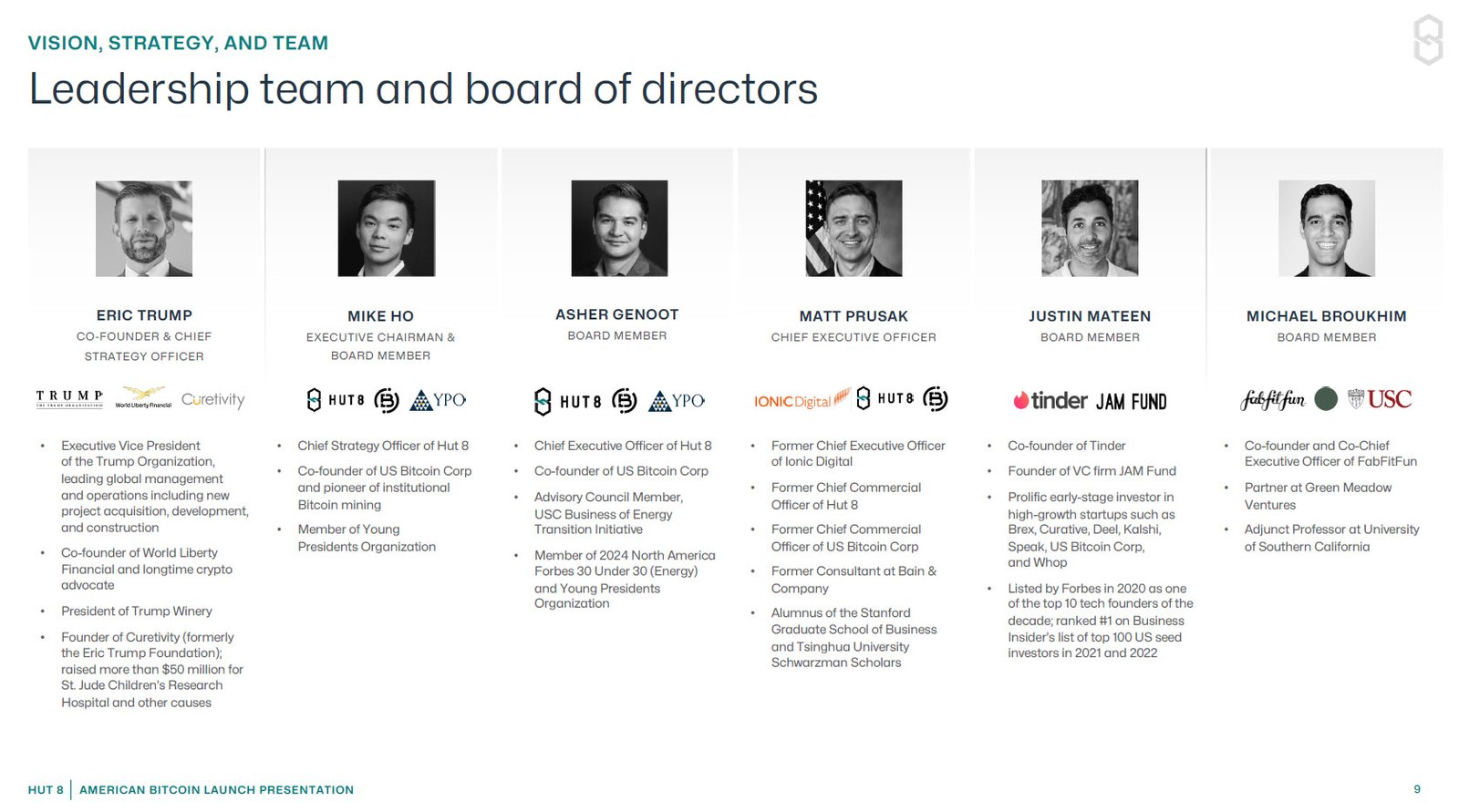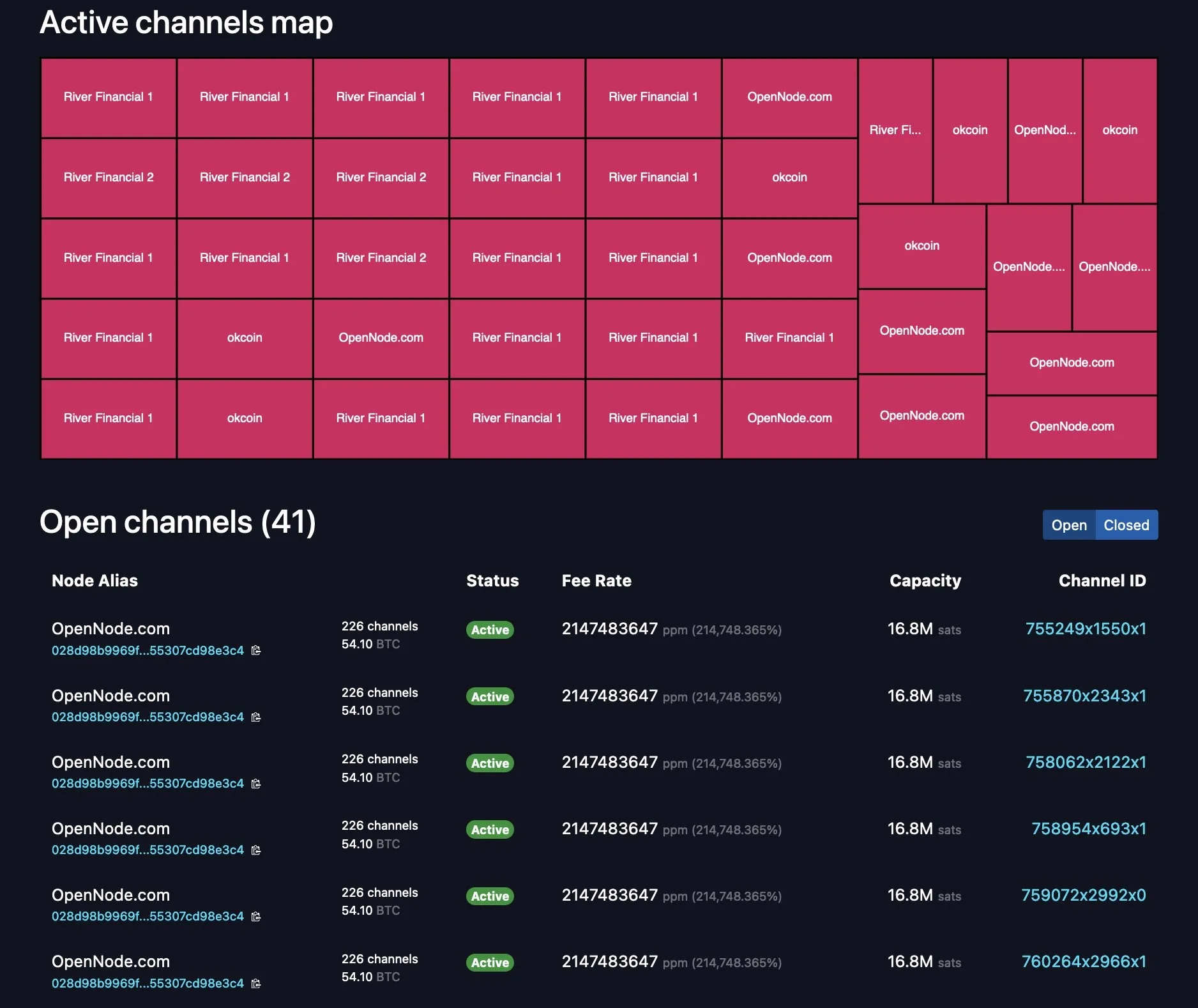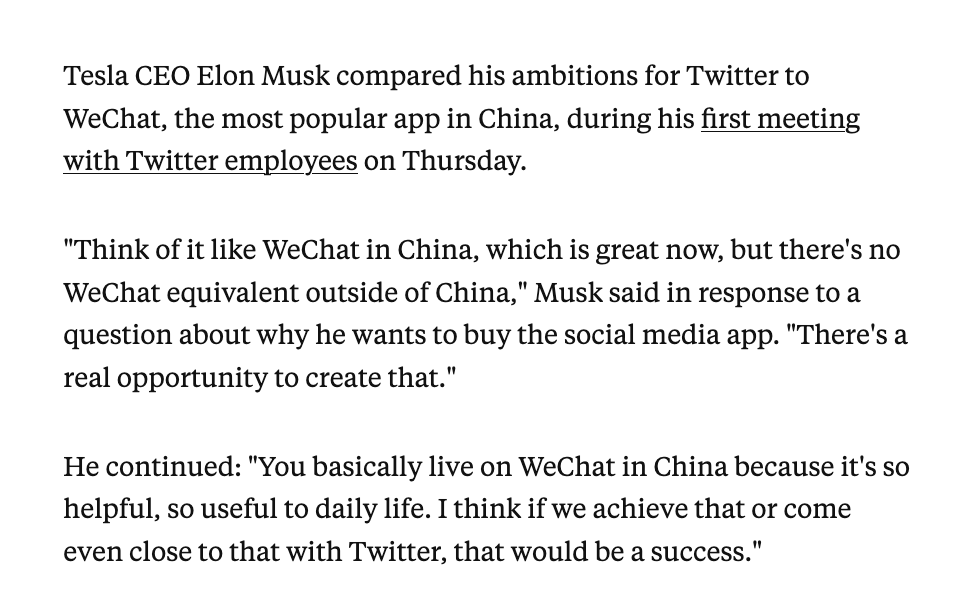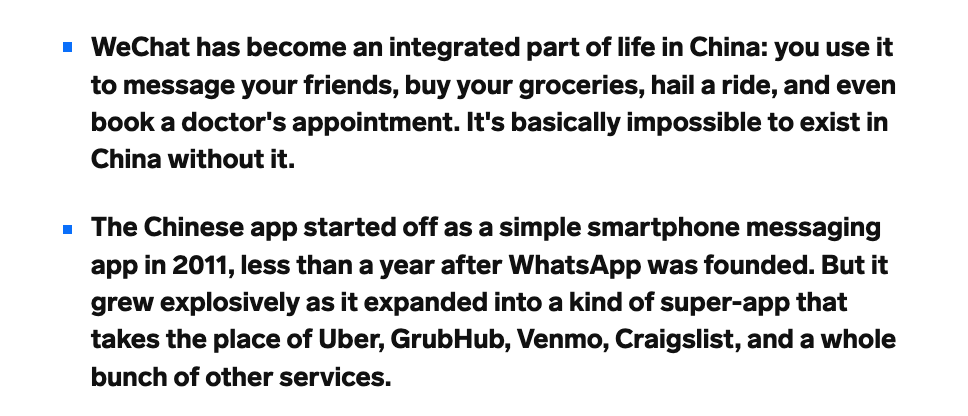-
 @ 21335073:a244b1ad
2025-05-21 16:58:36
@ 21335073:a244b1ad
2025-05-21 16:58:36The other day, I had the privilege of sitting down with one of my favorite living artists. Our conversation was so captivating that I felt compelled to share it. I’m leaving his name out for privacy.
Since our last meeting, I’d watched a documentary about his life, one he’d helped create. I told him how much I admired his openness in it. There’s something strange about knowing intimate details of someone’s life when they know so little about yours—it’s almost like I knew him too well for the kind of relationship we have.
He paused, then said quietly, with a shy grin, that watching the documentary made him realize how “odd and eccentric” he is. I laughed and told him he’s probably the sanest person I know. Because he’s lived fully, chasing love, passion, and purpose with hardly any regrets. He’s truly lived.
Today, I turn 44, and I’ll admit I’m a bit eccentric myself. I think I came into the world this way. I’ve made mistakes along the way, but I carry few regrets. Every misstep taught me something. And as I age, I’m not interested in blending in with the world—I’ll probably just lean further into my own brand of “weird.” I want to live life to the brim. The older I get, the more I see that the “normal” folks often seem less grounded than the eccentric artists who dare to live boldly. Life’s too short to just exist, actually live.
I’m not saying to be strange just for the sake of it. But I’ve seen what the crowd celebrates, and I’m not impressed. Forge your own path, even if it feels lonely or unpopular at times.
It’s easy to scroll through the news and feel discouraged. But actually, this is one of the most incredible times to be alive! I wake up every day grateful to be here, now. The future is bursting with possibility—I can feel it.
So, to my fellow weirdos on nostr: stay bold. Keep dreaming, keep pushing, no matter what’s trending. Stay wild enough to believe in a free internet for all. Freedom is radical—hold it tight. Live with the soul of an artist and the grit of a fighter. Thanks for inspiring me and so many others to keep hoping. Thank you all for making the last year of my life so special.
-
 @ 51bbb15e:b77a2290
2025-05-21 00:24:36
@ 51bbb15e:b77a2290
2025-05-21 00:24:36Yeah, I’m sure everything in the file is legit. 👍 Let’s review the guard witness testimony…Oh wait, they weren’t at their posts despite 24/7 survellience instructions after another Epstein “suicide” attempt two weeks earlier. Well, at least the video of the suicide is in the file? Oh wait, a techical glitch. Damn those coincidences!
At this point, the Trump administration has zero credibility with me on anything related to the Epstein case and his clients. I still suspect the administration is using the Epstein files as leverage to keep a lot of RINOs in line, whereas they’d be sabotaging his agenda at every turn otherwise. However, I just don’t believe in ends-justify-the-means thinking. It’s led almost all of DC to toss out every bit of the values they might once have had.
-
 @ 8aa70f44:3073d1a6
2025-05-21 13:07:14
@ 8aa70f44:3073d1a6
2025-05-21 13:07:14Earlier this year I launched the asknostr.site project which has been a great journey and learning experience. I had wanted to write down my goals and ideas with the project but didn't get to it yet. Primal launching the article editor was a trigger for me to go for it.
Ever since I joined Nostr i was looking for ways to apply my skillset solve a problem and help with adoption. Around Christmas I figured that a Quora/Stackoverflow alternative is something that needs to exist on Nostr.
Before I knew it I had a pretty decent prototype. And because the network already had so much awesome content, contributors and authors I was never discouraged by the challenge that kills so many good ideas -> "Where do I get the first users?".
Since the initial announcement I have received so much encouragement through zaps, likes, DM's, and maybe most of all seeing the increase in usage of the site and #asknostr content kept me going.
Current State
The current version of the site is stable and most bugs are hashed out. After logging in (remote signer, extension or nsec) you can engage with content through votes, comments and replies. Or simply ask a new question.
All content is stored in the site's own private relay and preprocessed/computed into a single data store (postgres) so the site is fast, accessible and crawl-able.
The site supports browsing hashtags, voting/commenting on answers, asking new questions and every contributor get their own profile (example). At the time of writing the site has 41k questions, almost 200k replies/comments and upwards of 5 million sats purely for #asknostr content.
What to expect/On my list
There are plenty of things and UI bugs that need love and between writing the draft of this post and hitting publish I shipped 3 minor bug fixes. Little by little, bit by bit...
In addition to all those small details here is an overview of the things on my own wish list:
-
Inline Zaps: Ability to zap from the asknostr.site interface. Click the zap button, specify or pick the number of sats zap away.
-
Contributor Rank: A leaderboard to add some gamification. More recognition to those nostriches that spend their time helping other people out
-
Search by Keyword: Search all content by keywords. Experiment with the index to show related questions or answers
-
Better User Profiles: Improve the user profile so it shows all the profile questions and answers. Quick buttons to follow or zap that person. Better insights in the topics (hashtags) the profile contributes to
-
Bookmarks: Ability to bookmark questions and answers. Increase bookmark weight as a signal to rank answers.
-
Smarter Scoring: Tune how answers are scored (winning answer formula). Perhaps give more weight to the question author or use WoT. Not sure yet.
All of this is happening at some point so follow me if you want to stay up to date.
Goals
To manage expectations and keep me focussed I write down the mid and long term goals of the project.
Long term
Call me cheesy but I believe that humanity will flourish through an open web and sound money. My own journey started from with bitcoin but if you asked me today if it's BTC or nostr that is going to have the most impact I wouldn't know what to answer. Chicken or egg?
The goal of the project is to offer an open platform that empowers individuals to ask questions, share expertise and access high-quality information across different topics. The project empowers anyone to monetize their experience creating a sustainable ecosystem that values and rewards knowledge sharing. This will ultimately democratize access to knowledge for all.
Mid term
The project can help a lot with onboarding new users onto the network. Once we start to rank on certain topics we can get a piece of the search traffic pie (StackOverflows 12 million, and Quora 150 million visitors per month) which is a great way to expose people to the power of the network.
First time visitors do not need to know about nostr or zaps to receive value. They can browse around, discover interesting content and perhaps even create a profile without even knowing they are on Nostr now.
Gradually those users will understand the value of the network through better rankings (zaps beats likes), a cross-client experience and a profile that can be used on any nostr site or app.
In order for the site to do that we need to make sure content is browsable by language, (sub)topics and and we double down on 'the human touch' with real contributors and not LLMs.
Short Term Goal
The first goal is to make the site really good and an important resource for existing Nostr users. Enable visitors to search and discover what they are interested in. Integrate within the existing nostr eco system with 'open in' functionality and quick links to interesting projects (followerpacks?)
One of things i want to get right is to improve user retention by making the whole Q\&A experience more sticky. I want to run some experiments (bots, award, summaries) to get more people to use asknostr.site more often and come back.
What about the name?
Finally the big question: What about the asknostr.site name? I don't like the name that much but it's what people know. I think there is a high chance that people will discover Nostr apps like Olas, Primal or Damus without needing to know what NOSTR is or means.
Therefore I think there is a good chance that the project won't be called asknostr.site forever. I guess it all depends on where we all take this.
Onwards!
-
-
 @ c9badfea:610f861a
2025-05-20 19:49:20
@ c9badfea:610f861a
2025-05-20 19:49:20- Install Sky Map (it's free and open source)
- Launch the app and tap Accept, then tap OK
- When asked to access the device's location, tap While Using The App
- Tap somewhere on the screen to activate the menu, then tap ⁝ and select Settings
- Disable Send Usage Statistics
- Return to the main screen and enjoy stargazing!
ℹ️ Use the 🔍 icon in the upper toolbar to search for a specific celestial body, or tap the 👁️ icon to activate night mode
-
 @ 57d1a264:69f1fee1
2025-05-21 05:47:41
@ 57d1a264:69f1fee1
2025-05-21 05:47:41As a product builder over too many years to mention, I’ve lost count of the number of times I’ve seen promising ideas go from zero to hero in a few weeks, only to fizzle out within months.
The problem with most finance apps, however, is that they often become a reflection of the internal politics of the business rather than an experience solely designed around the customer. This means that the focus is on delivering as many features and functionalities as possible to satisfy the needs and desires of competing internal departments, rather than providing a clear value proposition that is focused on what the people out there in the real world want. As a result, these products can very easily bloat to become a mixed bag of confusing, unrelated and ultimately unlovable customer experiences—a feature salad, you might say.
Financial products, which is the field I work in, are no exception. With people’s real hard-earned money on the line, user expectations running high, and a crowded market, it’s tempting to throw as many features at the wall as possible and hope something sticks. But this approach is a recipe for disaster.
Here’s why: https://alistapart.com/article/from-beta-to-bedrock-build-products-that-stick/
https://stacker.news/items/985285
-
 @ 04c915da:3dfbecc9
2025-05-20 15:53:48
@ 04c915da:3dfbecc9
2025-05-20 15:53:48This piece is the first in a series that will focus on things I think are a priority if your focus is similar to mine: building a strong family and safeguarding their future.
Choosing the ideal place to raise a family is one of the most significant decisions you will ever make. For simplicity sake I will break down my thought process into key factors: strong property rights, the ability to grow your own food, access to fresh water, the freedom to own and train with guns, and a dependable community.
A Jurisdiction with Strong Property Rights
Strong property rights are essential and allow you to build on a solid foundation that is less likely to break underneath you. Regions with a history of limited government and clear legal protections for landowners are ideal. Personally I think the US is the single best option globally, but within the US there is a wide difference between which state you choose. Choose carefully and thoughtfully, think long term. Obviously if you are not American this is not a realistic option for you, there are other solid options available especially if your family has mobility. I understand many do not have this capability to easily move, consider that your first priority, making movement and jurisdiction choice possible in the first place.
Abundant Access to Fresh Water
Water is life. I cannot overstate the importance of living somewhere with reliable, clean, and abundant freshwater. Some regions face water scarcity or heavy regulations on usage, so prioritizing a place where water is plentiful and your rights to it are protected is critical. Ideally you should have well access so you are not tied to municipal water supplies. In times of crisis or chaos well water cannot be easily shutoff or disrupted. If you live in an area that is drought prone, you are one drought away from societal chaos. Not enough people appreciate this simple fact.
Grow Your Own Food
A location with fertile soil, a favorable climate, and enough space for a small homestead or at the very least a garden is key. In stable times, a small homestead provides good food and important education for your family. In times of chaos your family being able to grow and raise healthy food provides a level of self sufficiency that many others will lack. Look for areas with minimal restrictions, good weather, and a culture that supports local farming.
Guns
The ability to defend your family is fundamental. A location where you can legally and easily own guns is a must. Look for places with a strong gun culture and a political history of protecting those rights. Owning one or two guns is not enough and without proper training they will be a liability rather than a benefit. Get comfortable and proficient. Never stop improving your skills. If the time comes that you must use a gun to defend your family, the skills must be instinct. Practice. Practice. Practice.
A Strong Community You Can Depend On
No one thrives alone. A ride or die community that rallies together in tough times is invaluable. Seek out a place where people know their neighbors, share similar values, and are quick to lend a hand. Lead by example and become a good neighbor, people will naturally respond in kind. Small towns are ideal, if possible, but living outside of a major city can be a solid balance in terms of work opportunities and family security.
Let me know if you found this helpful. My plan is to break down how I think about these five key subjects in future posts.
-
 @ 04c915da:3dfbecc9
2025-05-20 15:47:16
@ 04c915da:3dfbecc9
2025-05-20 15:47:16Here’s a revised timeline of macro-level events from The Mandibles: A Family, 2029–2047 by Lionel Shriver, reimagined in a world where Bitcoin is adopted as a widely accepted form of money, altering the original narrative’s assumptions about currency collapse and economic control. In Shriver’s original story, the failure of Bitcoin is assumed amid the dominance of the bancor and the dollar’s collapse. Here, Bitcoin’s success reshapes the economic and societal trajectory, decentralizing power and challenging state-driven outcomes.
Part One: 2029–2032
-
2029 (Early Year)\ The United States faces economic strain as the dollar weakens against global shifts. However, Bitcoin, having gained traction emerges as a viable alternative. Unlike the original timeline, the bancor—a supranational currency backed by a coalition of nations—struggles to gain footing as Bitcoin’s decentralized adoption grows among individuals and businesses worldwide, undermining both the dollar and the bancor.
-
2029 (Mid-Year: The Great Renunciation)\ Treasury bonds lose value, and the government bans Bitcoin, labeling it a threat to sovereignty (mirroring the original bancor ban). However, a Bitcoin ban proves unenforceable—its decentralized nature thwarts confiscation efforts, unlike gold in the original story. Hyperinflation hits the dollar as the U.S. prints money, but Bitcoin’s fixed supply shields adopters from currency devaluation, creating a dual-economy split: dollar users suffer, while Bitcoin users thrive.
-
2029 (Late Year)\ Dollar-based inflation soars, emptying stores of goods priced in fiat currency. Meanwhile, Bitcoin transactions flourish in underground and online markets, stabilizing trade for those plugged into the bitcoin ecosystem. Traditional supply chains falter, but peer-to-peer Bitcoin networks enable local and international exchange, reducing scarcity for early adopters. The government’s gold confiscation fails to bolster the dollar, as Bitcoin’s rise renders gold less relevant.
-
2030–2031\ Crime spikes in dollar-dependent urban areas, but Bitcoin-friendly regions see less chaos, as digital wallets and smart contracts facilitate secure trade. The U.S. government doubles down on surveillance to crack down on bitcoin use. A cultural divide deepens: centralized authority weakens in Bitcoin-adopting communities, while dollar zones descend into lawlessness.
-
2032\ By this point, Bitcoin is de facto legal tender in parts of the U.S. and globally, especially in tech-savvy or libertarian-leaning regions. The federal government’s grip slips as tax collection in dollars plummets—Bitcoin’s traceability is low, and citizens evade fiat-based levies. Rural and urban Bitcoin hubs emerge, while the dollar economy remains fractured.
Time Jump: 2032–2047
- Over 15 years, Bitcoin solidifies as a global reserve currency, eroding centralized control. The U.S. government adapts, grudgingly integrating bitcoin into policy, though regional autonomy grows as Bitcoin empowers local economies.
Part Two: 2047
-
2047 (Early Year)\ The U.S. is a hybrid state: Bitcoin is legal tender alongside a diminished dollar. Taxes are lower, collected in BTC, reducing federal overreach. Bitcoin’s adoption has decentralized power nationwide. The bancor has faded, unable to compete with Bitcoin’s grassroots momentum.
-
2047 (Mid-Year)\ Travel and trade flow freely in Bitcoin zones, with no restrictive checkpoints. The dollar economy lingers in poorer areas, marked by decay, but Bitcoin’s dominance lifts overall prosperity, as its deflationary nature incentivizes saving and investment over consumption. Global supply chains rebound, powered by bitcoin enabled efficiency.
-
2047 (Late Year)\ The U.S. is a patchwork of semi-autonomous zones, united by Bitcoin’s universal acceptance rather than federal control. Resource scarcity persists due to past disruptions, but economic stability is higher than in Shriver’s original dystopia—Bitcoin’s success prevents the authoritarian slide, fostering a freer, if imperfect, society.
Key Differences
- Currency Dynamics: Bitcoin’s triumph prevents the bancor’s dominance and mitigates hyperinflation’s worst effects, offering a lifeline outside state control.
- Government Power: Centralized authority weakens as Bitcoin evades bans and taxation, shifting power to individuals and communities.
- Societal Outcome: Instead of a surveillance state, 2047 sees a decentralized, bitcoin driven world—less oppressive, though still stratified between Bitcoin haves and have-nots.
This reimagining assumes Bitcoin overcomes Shriver’s implied skepticism to become a robust, adopted currency by 2029, fundamentally altering the novel’s bleak trajectory.
-
-
 @ 9ca447d2:fbf5a36d
2025-05-22 03:01:50
@ 9ca447d2:fbf5a36d
2025-05-22 03:01:50UFC legend Conor McGregor has entered the Bitcoin space, calling on his home country of Ireland to create a national Bitcoin reserve. The proposal has sparked a frenzy online and across Ireland.
McGregor, famous globally for his UFC achievements, is now pushing for a financial revolution in Ireland. In a recent post on X, the 36-year-old fighter said Bitcoin can give power back to the people.
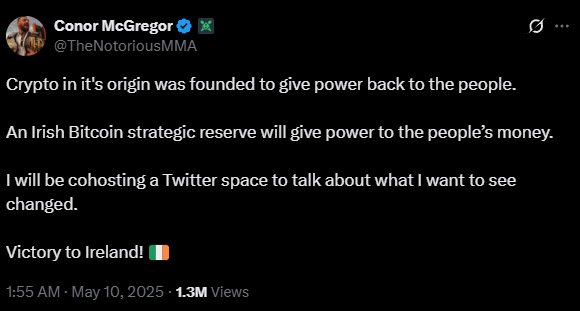
Conor McGregor on X
“Crypto in its origin was founded to give power back to the people,” McGregor wrote. “An Irish Bitcoin strategic reserve will give power to the people’s money.”
The post went viral with over 735,000 views in under 12 hours. McGregor announced he will be co-hosting a Twitter Space to discuss his vision and invited Bitcoin experts and public figures to join.
McGregor’s call for a bitcoin reserve is not an isolated event. It comes at a time when several other countries are exploring or have already added bitcoin to their national strategies.
The U.S. recently made headlines when President Donald Trump signed an executive order to create a Strategic Bitcoin Reserve. Arizona and New Hampshire have also done it at the state level.
El Salvador and Bhutan have also taken the same step. There have been reports of Russia planning to add bitcoin to its reserves by 2028 and the Polish government has proposals to do the same.
McGregor says Ireland shouldn’t be left behind. He believes bitcoin’s fixed supply, neutrality and decentralization make it the perfect hedge against inflation and a modern alternative to gold.
“Now it’s time to change the crypto game,” McGregor posted, signaling he will bring digital assets into the national conversation.
Many of McGregor’s fans and Bitcoin enthusiasts are on board with the idea, but some experts and commenters are urging caution. There are comments on his social media posts telling him to focus on Bitcoin only and not include other cryptos in the reserve.
They warned him to choose his words more carefully, not to mix “crypto” with Bitcoin. Daniel Sempere Pico commented:
“Crypto is mostly hot air and scams. Bitcoin is not crypto. Focus on bitcoin, Conor. Focus on bitcoin.”
McGregor’s call for a reserve comes as he launches his political career. In March 2025 he announced he will run as an independent candidate for the Irish presidency. His campaign is focused on crime reduction, stricter immigration and now financial reform through Bitcoin.
If elected, McGregor says he will bring change to Ireland, starting with how the country handles its national reserves. He wants bitcoin to be the cornerstone of a modern decentralized financial strategy.
But it might be a big ask. Ireland has not commented on McGregor’s proposal and experts say it’s got major regulatory and political hurdles.
As an independent candidate with no party backing, McGregor will need to build public and political support to make it happen.
-
 @ 9ca447d2:fbf5a36d
2025-05-22 03:01:49
@ 9ca447d2:fbf5a36d
2025-05-22 03:01:49Gen Z (those born between 1997 and 2012) are not rushing to stack sats, and Oliver Porter, Founder & CEO of Jippi, understands the challenge better than most. His strategy revolves around adapting Bitcoin education to fit seamlessly into the digital lives of young adults.
“We need to meet them where they are,” Oliver explains. “90% of Gen Z plays games. 70% expect to earn rewards.”
So, what will effectively introduce them to Bitcoin? In Oliver’s mind, the answer is simple: games that don’t feel preachy but still plant the orange pill.

Learn more at Jippi.app
That’s exactly what Jippi is. Based in Austin, Texas, the team has created a mobile augmented reality (AR) game that rewards players in bitcoin and sneakily teaches them why sound money matters.
“It’s Pokémon GO… but for sats,” Oliver puts it succinctly.

Jippi is like Pokemon Go, but for sats
Oliver’s Bitcoin journey, like many in the space, began long before he was ready. A former colleague had tried planting the seed years earlier, handing him a copy of The Bitcoin Standard. But the moment passed.
It wasn’t until the chaos of 2020 when lockdowns hit, printing presses roared, and civil liberties shrank that the message finally landed for him.
“The government got so good at doing reverse Robin Hood,” Oliver explains. “They steal from the working population and reward the rich.”
By 2020, though, the absurdity of the covid hysteria had caused his eyes to be opened and the orange light seemed the best path back to freedom.
He left the UK for Austin “one of the best places for Bitcoiners,” he says, and dove headfirst into the industry, working at Swan for a year before founding Jippi on PlebLab’s accelerator program.
Jippi’s flagship game lets players roam their cities hunting digital creatures, Bitcoin Beasts, tied to real-world locations. Catching them requires answering Bitcoin trivia, and the reward is sats.
No jargon. No hour-long lectures. Just gameplay with sound money principles woven right in.
The model is working. At a recent hackathon in Austin, Jippi beat out 14 other teams to win first place and $15,000 in prize money.

Oliver of Jippi won Top Builder Season 2 — PlebLab on X
“We’re backdooring Bitcoin education,” Oliver admits. “And while we’re at it, encouraging people to get outside and touch grass.”
Not everyone’s been thrilled. When Jippi team members visited one of the more liberal-leaning places in Texas, UT Austin, to test interest in Bitcoin, they found some seriously committed no-coiners on the campus.
“One young woman told me, ‘I would rather die than talk about Bitcoin,'” Oliver recalls, highlighting the cultural resistance that’s built up among younger demographics.
This resistance is backed by hard data. According to Oliver, some of the Bitcoin podcasters they met with in the space to do market research reported that less than 1% of their listeners are from Gen Z and that number is dropping.
“Unless we find a way to capture their interest in a meaningful way, there’s going to be a big problem around trying to sway Gen Z away from the siren call of s***coins and crypto casinos and towards Bitcoin,” Oliver warns.
Jippi’s next big move is Las Vegas, where they’ll launch the Beast Catch experience at the Venetian during a major Bitcoin event. To mark the occasion, they’re opening up six limited sponsorship spots for Bitcoin companies, each one tied to a custom in-game beast.

Jippi looks to launch a special event at Bitcoin 2025
“It’s real estate inside the game,” Oliver explains. “Brands become allies, not intrusions. You get a logo, company name, and call to action, so we can push people to your site or app.”
Bitcoin Well—an automatic self-custody Bitcoin platform—has claimed Beast #1. Only five exclusive spots remain for Bitcoin companies to “beastify their brand” through Jippi’s immersive AR game.
“I love the Jippi mission. I think gamified learning is how we will onboard the next generation and it’s exciting to see what the Jippi team is doing! I love working with bitcoiners towards our common mission – bullish!” said Adam O’Brien, Bitcoin Well CEO.
Jippi’s sponsorship model is simple: align incentives, respect users, and support builders. Instead of throwing ad money at tech giants, Bitcoin companies can connect with new users naturally while they’re having fun and earning sats in the process.
For Bitcoin companies looking to reach a younger demographic, this represents a unique opportunity to showcase their brand to up to 30,000 potential customers at the Vegas event.
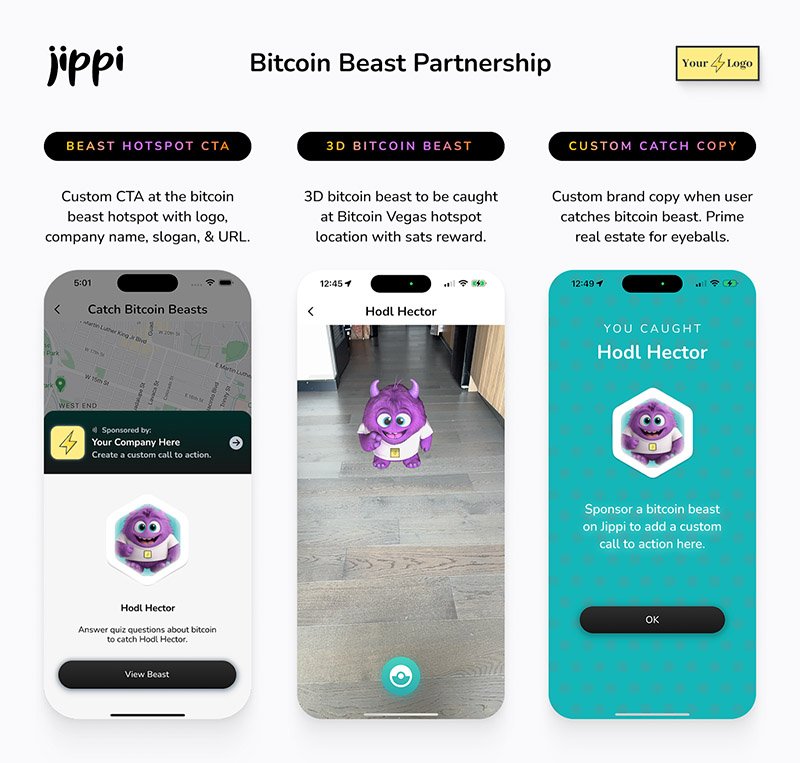
Jippi Bitcoin Beast partnership
While Jippi’s current focus is simple, get the game into more cities, Oliver sees a future where AR glasses and AI help personalize Bitcoin education even further.
“The magic is going to really happen when Apple releases the glasses form factor,” he says, describing how augmented reality could enhance real-world connections rather than isolate users.
In the longer term, Jippi aims to evolve from a free-to-play model toward a pay-to-play version with higher stakes. Users would form “tribes” with friends to compete for substantial bitcoin prizes, creating social connections along with financial education.
Unlike VC-backed startups, Jippi is raising funds pleb style via Timestamp, an open investment platform for Bitcoin companies.
“You don’t have to be an accredited investor,” Oliver explains. “You’re directly supporting the parallel Bitcoin economy by investing in Bitcoin companies for equity.”
Anyone can invest as little as $100. Perks include early access, exclusive game content, and even creating your own beast design with your name/pseudonym and unique game lore. Each investment comes with direct ownership of an early-stage Bitcoin company like Jippi.
For Oliver, this is more than just a business. It’s about future-proofing Bitcoin adoption and ensuring Satoshi’s vision lives on, especially as many people are lured by altcoins, NFTs, and social media dopamine.
“We’re on the right side of history,” he says firmly. “I want my grandkids to know that early on in the Bitcoin revolution, games like Jippi helped make it stick.”
In a world increasingly absorbed by screens and short attention spans, Jippi’s combination of outdoor play, sats rewards, and Bitcoin education might be exactly the bridge Gen Z needs.
Interested in sponsoring a Beast or investing in Jippi? Reach out to Jippi directly by heading to their partnerships page on their website or visit their Timestamp page to invest in Jippi today.
-
 @ 6ad3e2a3:c90b7740
2025-05-20 13:49:50
@ 6ad3e2a3:c90b7740
2025-05-20 13:49:50I’ve written about MSTR twice already, https://www.chrisliss.com/p/mstr and https://www.chrisliss.com/p/mstr-part-2, but I want to focus on legendary short seller James Chanos’ current trade wherein he buys bitcoin (via ETF) and shorts MSTR, in essence to “be like Mike” Saylor who sells MSTR shares at the market and uses them to add bitcoin to the company’s balance sheet. After all, if it’s good enough for Saylor, why shouldn’t everyone be doing it — shorting a company whose stock price is more than 2x its bitcoin holdings and using the proceeds to buy the bitcoin itself?
Saylor himself has said selling shares at 2x NAV (net asset value) to buy bitcoin is like selling dollars for two dollars each, and Chanos has apparently decided to get in while the getting (market cap more than 2x net asset value) is good. If the price of bitcoin moons, sending MSTR’s shares up, you are more than hedged in that event, too. At least that’s the theory.
The problem with this bet against MSTR’s mNAV, i.e., you are betting MSTR’s market cap will converge 1:1 toward its NAV in the short and medium term is this trade does not exist in a vacuum. Saylor has described how his ATM’s (at the market) sales of shares are accretive in BTC per share because of this very premium they carry. Yes, we’ll dilute your shares of the company, but because we’re getting you 2x the bitcoin per share, you are getting an ever smaller slice of an ever bigger overall pie, and the pie is growing 2x faster than your slice is reducing. (I https://www.chrisliss.com/p/mstr how this works in my first post.)
But for this accretion to continue, there must be a constant supply of “greater fools” to pony up for the infinitely printable shares which contain only half their value in underlying bitcoin. Yes, those shares will continue to accrete more BTC per share, but only if there are more fools willing to make this trade in the future. So will there be a constant supply of such “fools” to keep fueling MSTR’s mNAV multiple indefinitely?
Yes, there will be in my opinion because you have to look at the trade from the prospective fools’ perspective. Those “fools” are not trading bitcoin for MSTR, they are trading their dollars, selling other equities to raise them maybe, but in the end it’s a dollars for shares trade. They are not selling bitcoin for them.
You might object that those same dollars could buy bitcoin instead, so they are surely trading the opportunity cost of buying bitcoin for them, but if only 5-10 percent of the market (or less) is buying bitcoin itself, the bucket in which which those “fools” reside is the entire non-bitcoin-buying equity market. (And this is not considering the even larger debt market which Saylor has yet to tap in earnest.)
So for those 90-95 percent who do not and are not presently planning to own bitcoin itself, is buying MSTR a fool’s errand, so to speak? Not remotely. If MSTR shares are infinitely printable ATM, they are still less so than the dollar and other fiat currencies. And MSTR shares are backed 2:1 by bitcoin itself, while the fiat currencies are backed by absolutely nothing. So if you hold dollars or euros, trading them for MSTR shares is an errand more sage than foolish.
That’s why this trade (buying BTC and shorting MSTR) is so dangerous. Not only are there many people who won’t buy BTC buying MSTR, there are many funds and other investment entities who are only able to buy MSTR.
Do you want to get BTC at 1:1 with the 5-10 percent or MSTR backed 2:1 with the 90-95 percent. This is a bit like medical tests that have a 95 percent accuracy rate for an asymptomatic disease that only one percent of the population has. If someone tests positive, it’s more likely to be a false one than an indication he has the disease*. The accuracy rate, even at 19:1, is subservient to the size of the respective populations.
At some point this will no longer be the case, but so long as the understanding of bitcoin is not widespread, so long as the dollar is still the unit of account, the “greater fools” buying MSTR are still miles ahead of the greatest fools buying neither, and the stock price and mNAV should only increase.
. . .
One other thought: it’s more work to play defense than offense because the person on offense knows where he’s going, and the defender can only react to him once he moves. Similarly, Saylor by virtue of being the issuer of the shares knows when more will come online while Chanos and other short sellers are borrowing them to sell in reaction to Saylor’s strategy. At any given moment, Saylor can pause anytime, choosing to issue convertible debt or preferred shares with which to buy more bitcoin, and the shorts will not be given advance notice.
If the price runs, and there is no ATM that week because Saylor has stopped on a dime, so to speak, the shorts will be left having to scramble to change directions and buy the shares back to cover. Their momentum might be in the wrong direction, though, and like Allen Iverson breaking ankles with a crossover, Saylor might trigger a massive short squeeze, rocketing the share price ever higher. That’s why he actually welcomes Chanos et al trying this copycat strategy — it becomes the fuel for outsized gains.
For that reason, news that Chanos is shorting MSTR has not shaken my conviction, though there are other more pertinent https://www.chrisliss.com/p/mstr-part-2 with MSTR, of which one should be aware. And as always, do your own due diligence before investing in anything.
* To understand this, consider a population of 100,000, with one percent having a disease. That means 1,000 have it, 99,000 do not. If the test is 95 percent accurate, and everyone is tested, 950 of the 1,000 will test positive (true positives), 50 who have it will test negative (false negatives.) Of the positives, 95 percent of 99,000 (94,050) will test negative (true negatives) and five percent (4,950) will test positive (false positives). That means 4,950 out of 5,900 positives (84%) will be false.
-
 @ 57d1a264:69f1fee1
2025-05-20 06:15:51
@ 57d1a264:69f1fee1
2025-05-20 06:15:51Deliberate (?) trade-offs we make for the sake of output speed.
... By sacrificing depth in my learning, I can produce substantially more work. I’m unsure if I’m at the correct balance between output quantity and depth of learning. This uncertainty is mainly fueled by a sense of urgency due to rapidly improving AI models. I don’t have time to learn everything deeply. I love learning, but given current trends, I want to maximize immediate output. I’m sacrificing some learning in classes for more time doing outside work. From a teacher’s perspective, this is obviously bad, but from my subjective standpoint, it’s unclear.
Finding the balance between learning and productivity. By trade, one cannot be productive in specific areas without first acquire the knowledge to define the processes needed to deliver. Designing the process often come on a try and fail dynamic that force us to learn from previous mistakes.
I found this little journal story fun but also little sad. Vincent's realization, one of us trading his learnings to be more productive, asking what is productivity without quality assurance?
Inevitably, parts of my brain will degenerate and fade away, so I need to consciously decide what I want to preserve or my entire brain will be gone. What skills am I NOT okay with offloading? What do I want to do myself?
Read Vincent's journal https://vvvincent.me/llms-are-making-me-dumber/
https://stacker.news/items/984361
-
 @ 57d1a264:69f1fee1
2025-05-20 06:02:26
@ 57d1a264:69f1fee1
2025-05-20 06:02:26Digital Psychology ↗Wall of impact website showcase a collection of success metrics and micro case studies to create a clear, impactful visual of your brand's achievements. It also displays a Wall of love with an abundance of testimonials in one place, letting the sheer volume highlight your brand's popularity and customer satisfaction.
And like these, many others collections like Testimonial mashup that combine multiple testimonials into a fast-paced, engaging reel that highlights key moments of impact in an attention-grabbing format.
Awards and certifications of websites highlighting third-party ratings and verification to signal trust and quality through industry-recognized achievements and standards.
View them all at https://socialproofexamples.com/
https://stacker.news/items/984357
-
 @ 9ca447d2:fbf5a36d
2025-05-22 03:01:47
@ 9ca447d2:fbf5a36d
2025-05-22 03:01:47Tokyo-listed investment firm Metaplanet has officially surpassed El Salvador in bitcoin holdings after its biggest-ever single purchase of the scarce digital asset.
On May 12, 2025, the company announced it had bought 1,241 Bitcoin (BTC) for approximately $123.8 million, or ¥18.4 billion. The average price per coin was about $102,111, marking the firm’s largest purchase to date.
This latest buy brings Metaplanet’s total bitcoin reserves to 6,796 BTC, worth over $700 million.
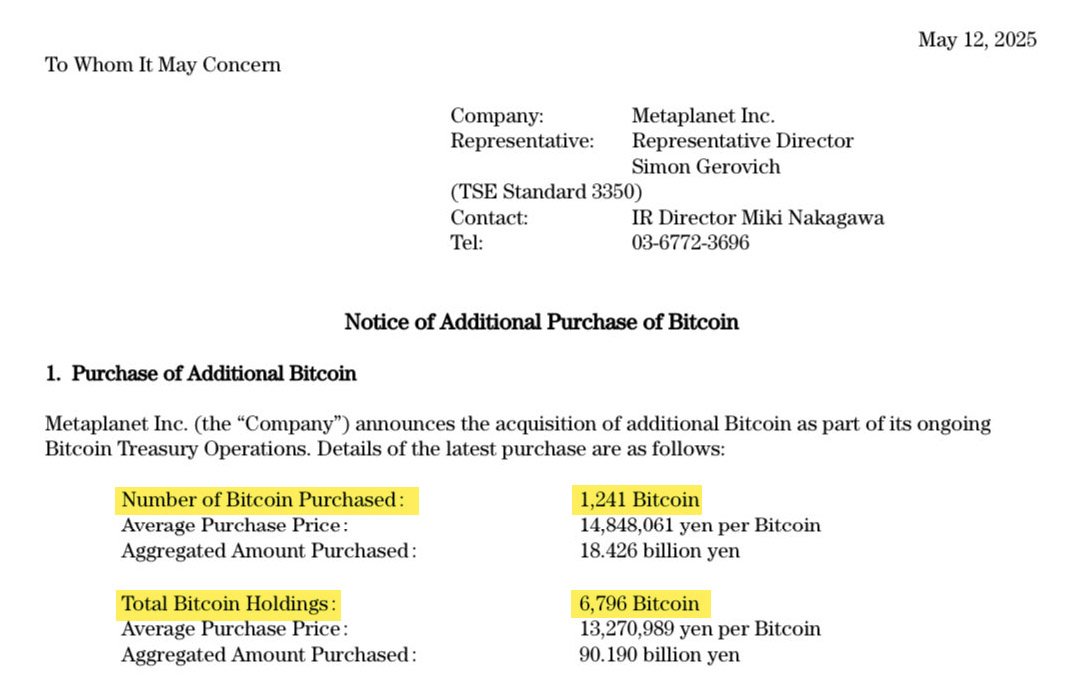
Metaplanet on X
That puts Metaplanet ahead of El Salvador, the Central American nation that made headlines in 2021 for adopting bitcoin as legal tender. According to its National Bitcoin Office, El Salvador currently holds 6,174 BTC, worth roughly $642 million.
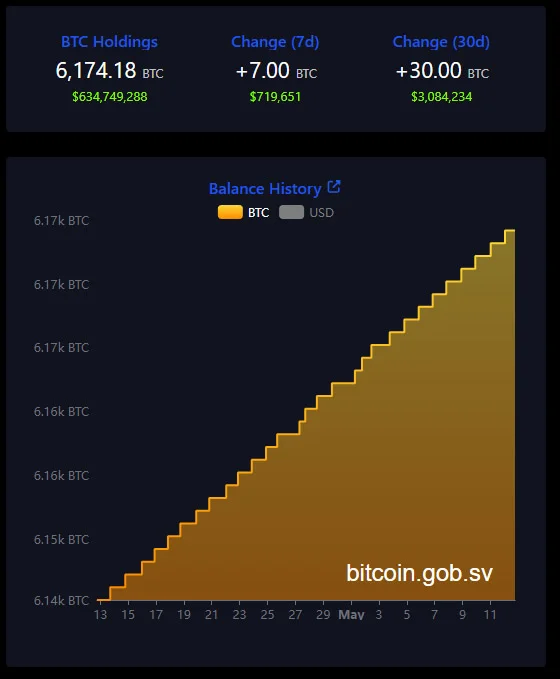
El Salvador bitcoin holdings — bitcoin.gob.sv
“Metaplanet now holds more bitcoin than El Salvador. From humble beginnings to rivaling nation-states, we’re just getting started,” said CEO Simon Gerovich on X after the company’s announcement.
The Japanese investment company started its bitcoin treasury strategy in April 2024 and has become the largest corporate holder of bitcoin in Asia and 11th globally. It aims to hold 10,000 BTC by the end of 2025.
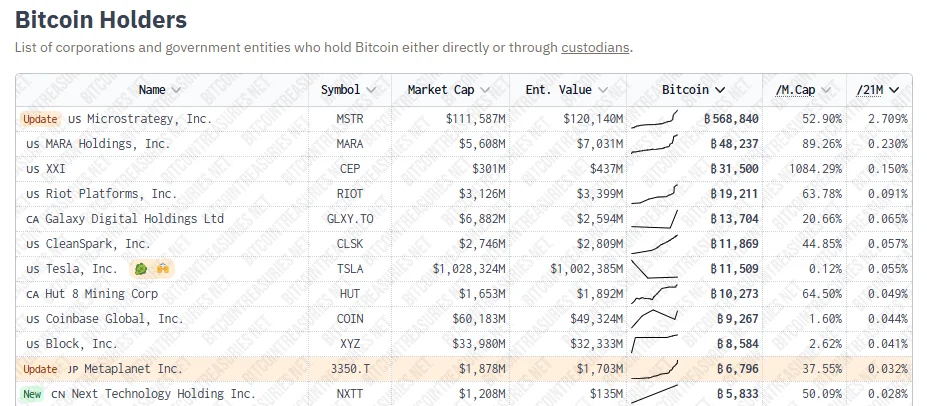
Metaplanet is now the 11th largest corporate holder of bitcoin — BitcoinTreasuries
To fund these purchases, the firm has turned to bond issuances, including zero-percent bonds. In early May, Metaplanet issued $25 million worth of 0% bonds under its EVO FUND program to finance bitcoin buys without diluting shares or taking on traditional debt.
And Metaplanet’s strategy seems to be working. Its BTC Yield — a proprietary metric that measures bitcoin accumulation per share — is 38% for Q2 2025 so far. In previous quarters, the firm reported 95.6% in Q1 and a whopping 309.8% in Q4 2024.
The stock price has also gone up 1,800% since May 2024 and 51% in 2025 alone, currently trading above 550 JPY.
Metaplanet is often called “Japan’s MicroStrategy”, a reference to the U.S.-based company Strategy (formerly MicroStrategy) led by Bitcoin advocate Michael Saylor. Strategy is the world’s largest corporate bitcoin holder with over 568,840 BTC in its coffers, worth more than $58 billion.
Like Strategy, Metaplanet is using creative financing tools such as convertible bonds and non-dilutive bond issuance to build a big bitcoin treasury. These financial instruments give the company the ability to fund further bitcoin purchases without diluting shareholders’ value.
Metaplanet is buying bitcoin very rapidly. This has become a trend in the corporate world, where private companies are challenging nation-states in the digital asset space.
Unlike governments which face regulatory and political hurdles, corporations like Metaplanet can move quickly and decisively. Since 2020 over 80 publicly traded companies have collectively bought more than 632,000 BTC worth over $65 billion.
This is a fundamental shift in how companies manage their treasuries — moving away from cash or bonds and towards the digital scarcity that bitcoin presents.
This creates a new form of financial power where corporations can hold a significant portion of a finite asset, unlike fiat currencies which governments can print to infinity.
-
 @ 9ca447d2:fbf5a36d
2025-05-22 03:01:46
@ 9ca447d2:fbf5a36d
2025-05-22 03:01:46May 13, 2025 – We are proud to announce that My First Bitcoin has received a $1 million grant from #startsmall. With this financial support from Jack Dorsey’s philanthropic initiative, we will continue to serve grassroots Bitcoin education initiatives worldwide.
This grant accelerates our work in the creation and distribution of free and open-source Bitcoin education materials and infrastructure.
It will not only help us improve existing resources, such as the Bitcoin Diploma, Bitcoin Intro Course, and teacher training workshops, but also to scale our digital platforms like our Online School and Community Hub.
As a non-profit, founded in 2021, we have grown from a local project into a global movement. Besides creating curricula and frameworks, our team has directly taught tens of thousands of in-person students, as we workshop and refine our materials based on real world feedback.
In 2023, we launched the Independent Bitcoin Educators Node Network, providing a space for others to join us on our mission. The network spans 65+ projects from 35+ countries, including circular economies, meetup organizers and other grassroots projects.
All commit to the same six pillars: that their education is independent, impartial, community-led, Bitcoin-only, quality, and focused on empowerment over profit.
While we support that network, it is now self-governing. We always seek to give power-to, rather than have power-over.
John Dennehy, founder and Executive Director of My First Bitcoin, explains:
“The revolution of Bitcoin education is that it teaches students HOW to think, not WHAT to think. Funding from sources with their own incentives is the greatest vulnerability that threatens that. Education will be captured by whoever funds it.
“We will never take any government money and frequently turn down funding from corporations and companies. The subtle influence of funding has ruined fiat education and we need to create alternative models for the revolution of Bitcoin education to realize its full potential.”
Funding for Bitcoin education must be transparent.
This grant is a huge win for all of us. For Bitcoin itself, but even more for Independent Bitcoin Education as a whole. It enables us to serve the global community better than ever before. It shows everyone what can be achieved if you stay close to your values.
“My First Bitcoin is a proof-of-concept for all independent Bitcoin educators that if you stay on the mission, even when it’s challenging, then you will come out the other side even stronger,” added Dennehy.
Arnold Hubach, Director of Communications of My First Bitcoin, continued:
“Open source money deserves open source education. Over the past few years, we’ve seen growing demand for our resources around the world, and we remain committed to serving everyone in the Bitcoin space who needs support.
“This funding enables us to plan further into the future and continue being the first-stop provider of free educational tools.”
We’re grateful to #startsmall for believing in our mission and for understanding that Bitcoin education should always be free from external influence. We’re also grateful to the community for helping us arrive at this point where we are ready to receive such a grant.
You lead us to where we are today. You have been our primary funding source. You will continue to lead us forward.
We will always serve the community.
We’re also grateful for our amazing team and their proof of work. The grant will accelerate the work that they are already doing, such as curricula development, teacher training programs, the expansion of the global network, building online platforms, and providing in-person classes.
We will continue to lead by example, we will continue to push the limits, and we will continue to reimagine what’s possible.
We do not seek to please power in this world, we seek to create a proof-of-concept for a better one where the individual is empowered and able to think critically.
If you are an educator in need of tools or infrastructure; please contact us.
If you can help us continue to build out these tools and maintain this growing global movement; please contact us.
If you are aligned with our mission and are a supporter of independent Bitcoin education, please donate.
We work for the public. In public.
-
 @ 9ca447d2:fbf5a36d
2025-05-22 03:01:45
@ 9ca447d2:fbf5a36d
2025-05-22 03:01:45American Bitcoin, a bitcoin mining company backed by President Donald Trump’s sons, is going public in a new merger deal with Gryphon Digital Mining. Investors and political observers are taking notice as it presents a mixture of Bitcoin, Wall Street and the Trump brand.
This reverse merger allows for American Bitcoin Corporation to become a publicly traded company. This will happen through a stock-for-stock merger with Gryphon Digital Mining, a small-cap bitcoin miner already listed on the Nasdaq.
Once the deal is done, the new company will be called American Bitcoin and will trade on the Nasdaq under the ticker symbol ABTC. The merger is expected to close in the 3rd quarter of 2025.
Eric Trump, who will be the Co-Founder and the Chief Strategy Officer, said:
“Our vision for American Bitcoin is to create the most investable Bitcoin accumulation platform in the market.”
The Trump family’s involvement has gotten a lot of attention. Eric Trump and Donald Trump Jr. launched American Bitcoin in March this year with digital asset infrastructure company Hut 8, which owns 80% of American Bitcoin.
American Bitcoin leadership team — Hut 8 presentation
After the merger, American Bitcoin shareholders — including the Trump brothers and Hut 8 — will own about 98% of the new company. Gryphon shareholders will own 2% even though Gryphon is the public company facilitating the merger.
Instead of an IPO (Initial Public Offering), American Bitcoin is going public through what’s called a reverse merger. This means it will take over Gryphon’s public listing.
This is often faster and simpler than a traditional IPO. It allows American Bitcoin to access public capital markets while maintaining operational and strategic control.
Hut 8 CEO Asher Genoot said the merger is a big step forward for the company. “By taking American Bitcoin public, we expect to unlock direct access to dedicated growth capital independent of Hut 8’s balance sheet,” Genoot said.
The announcement sent Gryphon’s stock soaring. Shares rose over 280% and Hut 8’s stock went up over 11%. Clearly investors are interested in bitcoin-focused public companies when the asset itself is close to its previous all-time high.
But not everyone is buying. Some investors and analysts are questioning what Gryphon is actually bringing to the table. Gryphon won’t have a seat on the board or any representation in the new management team. Their role seems to be just to provide the public listing.
Many questions remain unanswered because there are no details on mining operations and what Gryphon’s role is beyond the merger.
American Bitcoin’s goal goes far beyond just mining bitcoin. It wants to become a national bitcoin reserve builder and a major player in that space by storing large amounts of bitcoin as a strategic asset.
The company plans to take “capital-light” advantage of Hut 8’s existing infrastructure, so there won’t be any need to build massive new data centers. Hut 8 already manages over 1,000 megawatts of energy capacity, and apparently, they will handle all the mining operations.
This is happening at a tough time for the mining industry in the U.S. and globally.
Profit margins are shrinking, and companies are really feeling the pinch of high operational costs. Hut 8 just reported a 58% drop in revenue and a $134 million net loss for the first quarter of 2025.
-
 @ 9ca447d2:fbf5a36d
2025-05-22 03:01:44
@ 9ca447d2:fbf5a36d
2025-05-22 03:01:44Bitcoin-focused investment firm Twenty One Capital has made headlines after buying 4,812 BTC worth $458.7 million, making it the third-largest corporate holder of the scarce digital asset.
The move is a big and public one towards becoming the “ultimate Bitcoin investment vehicle” according to its leadership, and is turning heads in both bitcoin and tradfi world.
Tether, the issuer of the world’s largest stablecoin, bought the bitcoin on behalf of Twenty One Capital.
According to a filing with the U.S. Securities and Exchange Commission (SEC) on May 13, Tether acquired the bitcoin on May 9 at an average price of $95,319 per coin.
Twenty One Capital was launched in April 2025 through a SPAC merger with Cantor Equity Partners, a Cayman Islands-based firm affiliated with Wall Street giant Cantor Fitzgerald. The company is backed by Tether, Bitfinex exchange and Japanese investment giant SoftBank.
Related: Cantor Fitzgerald, Tether and SoftBank Launch $3B Bitcoin Venture
The firm is led by Jack Mallers, founder of the bitcoin payments app Strike, who has been vocal about bitcoin business models.
“We want to be the ultimate vehicle for the capital markets to participate in Bitcoin… building on top of Bitcoin,” said Mallers in an interview. “So we are a Bitcoin business at our core.”
At launch, Twenty One Capital had 31,500 bitcoin on the balance sheet with plans to get to at least 42,000 BTC.
The breakdown of that initial allocation was 23,950 BTC from Tether, 10,500 BTC from SoftBank and about 7,000 BTC from Bitfinex—all to be converted into equity at $10 per share.
The company is openly modeling its strategy after what Bitcoiners call “Saylorization”—a term coined after Michael Saylor, executive chairman of Strategy, who started large-scale bitcoin accumulation by corporations in 2020.
“Twenty One Capital isn’t just stacking sats,” said Bitcoin advocate Max Keiser, “It’s leading a generational shift in corporate capital allocation … Jack Mallers is taking the Saylor playbook and turning it into an arms race.”
The strategy is simple: use bitcoin per share as a metric instead of earnings per share, prioritize bitcoin accumulation over short-term profits, and use the capital markets to fund purchases. Mallers said:
“We do intend to raise as much capital as we possibly can to acquire bitcoin. We will never have bitcoin per share negative… Our intent is to make sure when you are a shareholder of Twenty One that you are getting wealthier in Bitcoin terms.”
The bitcoin purchase was made at a time of growing market momentum.
On May 14, bitcoin hit $105,000 briefly before settling at around $104,000—a 7.5% gain in the past week. Retail buying has also picked up, with purchases under $10,000 up 3.4% over two weeks, suggesting continued bullishness.
-
 @ 9ca447d2:fbf5a36d
2025-05-22 03:01:43
@ 9ca447d2:fbf5a36d
2025-05-22 03:01:43Singapore, May 14, 2025 — NEUTRON, the leading Lightning Network infrastructure provider in Asia, is announcing a new partnership with Cobo, a globally trusted digital asset custody platform.
Through this collaboration, Cobo will integrate Neutron’s Lightning Network API, enabling real-time, cost-effective Bitcoin transactions across its services.
Neutron’s mission is to make the Lightning Network the financial backbone for modern Bitcoin use, bridging traditional finance with Bitcoin’s borderless, decentralized economy.
“We’re thrilled to partner with Cobo, a trusted leader in custodial services, to further accelerate Bitcoin infrastructure across Asia,” said Albert Buu, CEO of Neutron.
“At Neutron, we are committed to providing enterprise businesses with easy and efficient integration into the Lightning Network, enabling next-generation global real-time settlement solutions.
“This partnership will not only drive innovation but also empower businesses across Asia with the fast, secure, and cost-effective benefits of Bitcoin payments.”
Neutron: The Lightning Engine for Bitcoin Adoption
Neutron provides a comprehensive API suite that allows businesses to instantly access the power of the Lightning Network, Bitcoin’s second-layer protocol designed for high-speed, scalable, and low-fee payments.
The integration is part of Neutron’s broader vision to equip forward-thinking institutions with the tools needed to participate in the next generation of Bitcoin utility.
Lightning-Powered Custody for the Next Era of Finance
Cobo’s integration of Neutron’s API gives institutional clients an additional option for BTC settlement, making Lightning Network access more programmable and easier to integrate within their existing systems.
“At Cobo, we’ve built our custody platform to combine uncompromising security with the scalability institutions need to grow,” said Dr. Changhao Jiang, CTO and Co-Founder of Cobo.
“Integrating Neutron’s Lightning Network API allows us to offer real-time, low-cost Bitcoin settlement at scale without compromising on trust or performance. Together, we’re laying the groundwork for faster, more efficient Bitcoin infrastructure across Asia.”
About Neutron
Neutron is Asia’s leading Bitcoin infrastructure company, helping businesses and individuals unlock the power of the Lightning Network, specializing in Lightning-as-a-Service.
nThrough its scalable API platform, mobile app, and lending product, Neutron empowers businesses and individuals to send, receive, save, and build with Bitcoin.
Want to bring Lightning into your product or platform? Reach out to our team at sales@neutron.me or visit us at www.neutron.meAbout Cobo
Cobo is a trusted leader in digital asset custody and wallet infrastructure, providing an all-in-one platform for organizations and developers to easily build, automate, and scale their digital asset businesses securely.
Founded in 2017 by blockchain pioneers and headquartered in Singapore, Cobo is trusted by more than 500 leading digital asset businesses globally, safeguarding billions of dollars in assets.
Today, Cobo offers the industry’s only unified wallet platform that integrates all four digital asset wallet technologies – Custodial Wallets, MPC Wallets, Smart Contract Wallets, and Exchange Wallets.
Committed to the highest security standards and regulatory compliance, Cobo has a zero-incident track record and holds ISO 27001, SOC2 (Type 1 and Type 2) certifications, as well as licenses in multiple jurisdictions.
Recognized for its industry-leading innovations, Cobo has received accolades from prestigious entities such as Hedgeweek and Global Custodian. For more information, please visit www.cobo.com
-
 @ 9ca447d2:fbf5a36d
2025-05-22 03:01:42
@ 9ca447d2:fbf5a36d
2025-05-22 03:01:42Ukraine is reportedly about to make history by becoming the first country in Europe to have a national bitcoin reserve, a move aimed at strengthening its economy during the war with Russia.
The plan is still in its early stages and Binance, the world’s largest digital asset exchange, is involved.
According to Incrypted, a Ukrainian digital asset news outlet, Ukrainian MP Yaroslav Zheleznyak, First Deputy Chairman of the Finance, Tax and Customs Policy Committee, confirmed that the draft law is almost ready and will be submitted to the parliament soon.
“We will soon submit a draft law from the industry allowing the creation of crypto reserves,” Zheleznyak told Incrypted.
Earlier discussions mentioned a broader “crypto reserve” but the current plan is focused on bitcoin as a strategic reserve asset. If approved, the law will allow the National Bank of Ukraine to hold bitcoin as part of the country’s official reserves.
Since the war with Russia started, Ukraine has become one of the most bitcoin-friendly countries in the world.
In 2022 and 2023 Ukraine raised over $100 million in digital asset donations for defense and humanitarian purposes. A report from Chainalysis ranked the country among the top 10 countries for bitcoin adoption globally.
A rather vague and unconfirmed report by BitcoinTreasuries.net states that “holdings of public officials” currently stand at 46,351 BTC.

Ukraine bitcoin holdings as reported by BitcoinTreasuries
Supporters of the bitcoin reserve say it will help Ukraine protect its economy from war-related instability, inflation and currency depreciation.
By going digital, the government is looking for modern tools to strengthen its financial system in uncertain times. This is not just about storing bitcoin, it’s about establishing clear laws for digital assets ownership, management and use.
Binance is playing an advisory role in the project. The company has worked with Ukraine on digital asset education and regulations in the past and is now helping to shape the legal framework for the bitcoin reserve.
Kirill Khomyakov, Binance’s regional head for Central and Eastern Europe, Central Asia and Africa, confirmed the company’s support, but warned it won’t be fast or easy.
“The creation of such a reserve will require significant changes in legislation,” Khomyakov said. “Another positive aspect is that this initiative will likely lead to greater clarity in the regulation of crypto assets in Ukraine.”
Despite the support from some officials, there are legal hurdles. Ukrainian laws don’t allow bitcoin to be in the official reserves. So the government needs to pass new laws for it to happen.
Efforts to legalize bitcoin in general have been going on for years. In 2021, a draft law on virtual assets was approved by Finance Committee but was withdrawn after the President’s Office and financial regulators objected.
Up to now, over 80 amendments have been proposed, showing how complicated the process is.
The Ministry of Digital Transformation is leading a larger reform that could introduce rules for digital asset exchanges, tax laws and anti-money laundering standards in the country.
Ukraine isn’t alone in considering bitcoin as a national reserve asset. In March 2025, the U.S. announced its own Strategic Bitcoin Reserve using BTC seized in criminal cases.
-
 @ 9ca447d2:fbf5a36d
2025-05-22 03:01:41
@ 9ca447d2:fbf5a36d
2025-05-22 03:01:41KYC database of Coinbase, the largest U.S. digital asset exchange, has been breached and up to 1% of monthly active users, or around 100,000 customers, have had their personal info stolen.
Hackers reportedly bribed overseas customer support agents and contractors to leak internal company info and user data. They then demanded $20 million and threatened to release the stolen data if Coinbase didn’t pay.
Instead of paying the ransom, Coinbase said no and is setting up a $20 million reward fund for anyone who can help catch the hackers.
“They then tried to extort Coinbase for $20 million to cover this up. We said no,” the company said in a blog post. “Instead of paying the $20 million ransom, we’re establishing a $20 million reward fund.”
So what’s been stolen? The breach, which was first disclosed in a filing with the U.S. Securities and Exchange Commission (SEC), did not involve any theft of customer funds, login credentials, private keys or wallets.
But the hackers did get:
- Full names
- Addresses
- Phone numbers
- Email addresses
- Last 4 digits of Social Security numbers
- Bank account numbers and some bank identifiers
- Government ID images (driver’s licenses, passports, etc.)
- Account balances and transaction history
- Internal corporate documents and training materials
Coinbase says Prime accounts were not affected and no passwords or 2FA codes were stolen.
According to Coinbase, the attackers targeted outsourced support agents in countries like India. They were offering cash bribes in exchange for access to the company’s internal customer support tools.
“What these attackers were doing was finding Coinbase employees and contractors based in India who were associated with our business process outsourcing or support operations, that kind of thing, and bribing them in order to obtain customer data,” said Philip Martin, Coinbase’s Chief Security Officer.
Coinbase said it first saw suspicious activity in January 2025 but didn’t get a direct email from the threat actors until May 11. The email had evidence of stolen data and the ransom demand.
Coinbase quickly launched an investigation, fired all the involved support agents and notified law enforcement. It also started notifying users via email on May 15.
The Coinbase data breach has hit it hard, financially and publicly. The company estimates it will spend $180-$400 million on security upgrades, reimbursements and other remediation.
Coinbase’s stock also took a hit, dropping 6.4% after the news broke, before rebounding.
Analysts say this couldn’t have come at a worse time, as Coinbase is about to be added to the S&P 500 index – a big deal for any publicly traded company.
It’s definitely an unfortunate timing. “This may push the industry to adopt stricter employee vetting and introduce some reputational risks,” said Bo Pei, analyst at U.S. Tiger Securities.
Coinbase will reimburse any customers who were tricked into sending their digital assets to the attackers as part of social engineering scams. They’ve also introduced new security measures:
- Extra ID verification for high-risk withdrawals
- Scam-awareness prompts
- A new U.S.-based support center
- Stronger insider threat monitoring
- Simulation testing for internal systems
Affected customers have already been notified and the exchange is working with U.S. and international law enforcement to track down the attackers.
This is part of a larger trend in the digital assets world. Earlier this year, Bybit, another exchange, was hit with a $1.5 billion theft, dubbed the biggest digital asset heist in history.
Research from Chainalysis shows over $2.2 billion was stolen from digital asset platforms in 2024 alone.
-
 @ 9ca447d2:fbf5a36d
2025-05-22 03:01:40
@ 9ca447d2:fbf5a36d
2025-05-22 03:01:40Donald Trump’s recent four-day visit took the President to Saudi Arabia, Qatar, and the United Arab Emirates. This visit has intertwined diplomatic relations with business interests, while simultaneously influencing the bitcoin market.
In Qatar, the President met with Emir Tanim bin Hamad Al Thani, resulting in over $243 billion in deals including major defense agreements, according to Bloomberg.
On May 15, the President made his visit to the Sheikh Zayed Grand Mosque in Abu Dhabi alongside Crown Prince Khaled bin Mohamed Al Nahyan. This occurs as the Trump family expands its business presence in the Middle East.
The Trump Organization is developing luxury properties across the region, including Trump Tower Dubai, real estate projects in Riyadh, and development in Jeddah and Oman.

Donald Trump and Mohammed bin Salman in King Khalid International Airport — NBCNews
Eric Trump publicly announced construction plans for Trump Tower Dubai just last month, highlighting the family’s ongoing commercial footprint in the region.
These business connections extend into the digital asset ecosystem as UAE-backed investment firm MGX recently announced it would use USD1, World Liberty Financial’s stablecoin to support a $2 billion investment in Binance, the world’s largest digital asset exchange, according to APNews.
This connection between Trump-aligned interests and major digital asset investments creates a potential avenue for market influence.
Historically, stability in the Middle East, especially among oil-rich nations, reduces global market volatility. This encourages risk appetite among investors, often leading to increased allocations to digital assets like bitcoin.
Middle East diplomacy directly affects global oil prices. Stable oil prices can lower inflation expectations and lead to interest rate cuts by the Fed. Lower rates lead to an increase in liquidity, having positive effects on bitcoin, an asset that benefits from money printing.
Related: Fed Rate Cuts Could Lead to Major Price Swings for Bitcoin
On the investment front, Abu Dhabi’s Wealth Fund, Mubadala Investment Company, has been focused on increasing their shares in BlackRock’s iShares Bitcoin Trust (IBIT).
According to a 13F filing with the U.S. Securities and Exchange Commission, Mubdala held 8.7 million IBIT shares, totaling $408.5 million as of March 31, 2025.
The Abu Dhabi Wealth Fund increased its shares by 500,000 since its last filing in December of 2024.
Back in March, the United States created a Strategic Bitcoin Reserve. The executive order states that the U.S. will not sell the bitcoin they already hold, and will create budget-neutral ways to increase their holdings.
The time has come where governments and wealth funds alike are jumping on board the Bitcoin train.
Trump’s recent visit to the Middle East illustrates how financial, diplomatic, and personal interests are becoming increasingly intertwined with Bitcoin and digital assets, serving as a new axis of influence in the U.S.-Middle East relations.
The combination of diplomatic progress and business expansion has heightened short-term volatility and trading volumes in the bitcoin market.
Trump’s business and digital asset ties in the region may further boost institutional interest and create an opportunity for more players to enter the market.
-
 @ 9ca447d2:fbf5a36d
2025-05-22 03:01:39
@ 9ca447d2:fbf5a36d
2025-05-22 03:01:39Bahrain-based Al Abraaj Restaurants Group has made history by becoming the first publicly-traded company in the Middle East to add bitcoin to its corporate treasury. This is a major step forward for regional bitcoin adoption.
On May 15, 2025, Al Abraaj Restaurants Group, a well-known restaurant chain listed on the Bahrain Bourse, announced it had bought 5 bitcoin (BTC) as part of a new treasury strategy. This makes the company the first in Bahrain, the GCC and the Middle East to officially hold bitcoin as a reserve asset.
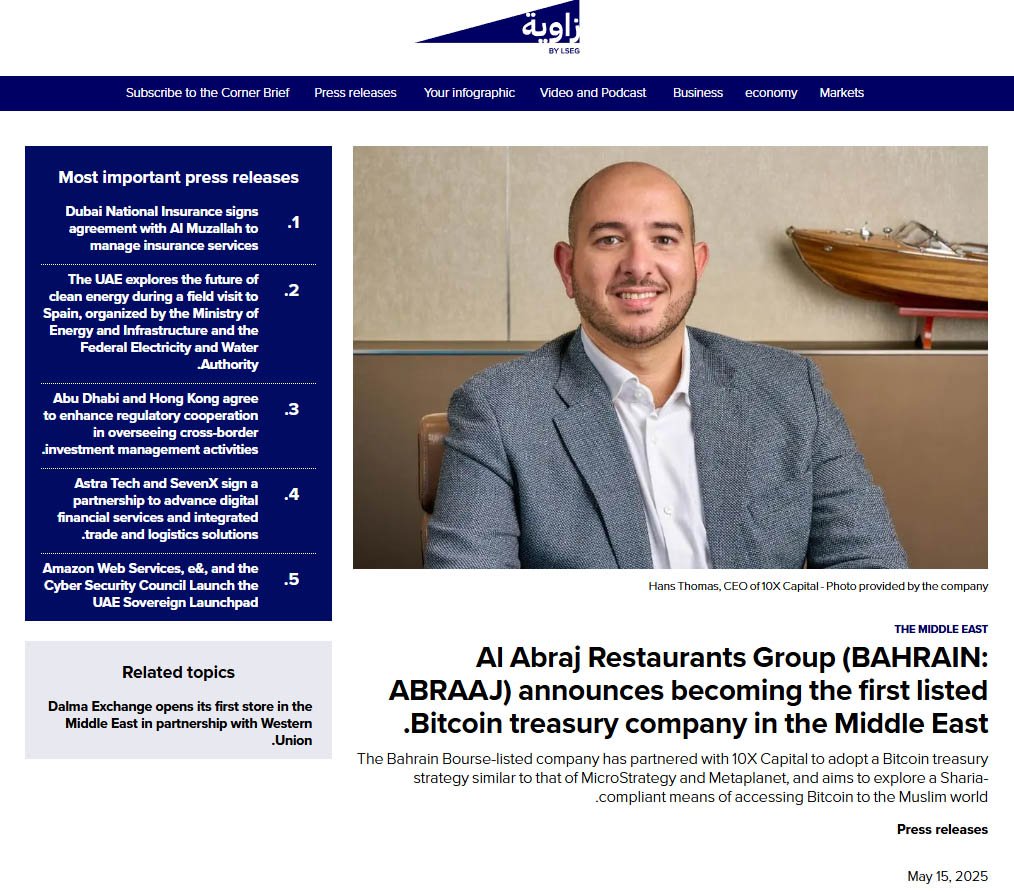
Al Abraaj adds bitcoin to its treasury — Zawya
This is a growing trend globally where companies are treating bitcoin not just as an investment but as a long-term store of value. Major companies like Strategy, Tesla and Metaplanet have already done this — and now Al Abraaj is following suit.
Metaplanet recently added 1,241 BTC to its treasury, boosting the company’s holdings above El Salvador’s.
Related: Metaplanet Overtakes El Salvador in Bitcoin Holdings After $126M Purchase
“Our initiative towards becoming a Bitcoin Treasury Company reflects our forward-thinking approach and dedication to maximizing shareholder value,” said Abdulla Isa, Chairman of the Bitcoin Treasury Committee at Al Abraaj.
Al Abraaj’s move is largely inspired by Michael Saylor, Executive Chairman of Strategy, the world’s largest corporate holder of bitcoin. Saylor’s strategy of allocating billions to bitcoin has set a model that other companies — now including Al Abraaj — are following.
A photo shared by the company even showed a meeting between an Al Abraaj representative and Saylor, with the company calling itself the “MicroStrategy of the Middle East”.
“We believe that Bitcoin will play a pivotal role in the future of finance, and we are excited to be at the forefront of this transformation in the Kingdom of Bahrain,” Isa added.
To support its bitcoin initiative, Al Abraaj has partnered with 10X Capital, a New York-based investment firm that specializes in digital assets.
10X Capital has a strong track record in bitcoin treasury strategies, and recently advised Nakamoto Holdings on a $710 million deal — the largest of its kind.
With 10X’s help, Al Abraaj looks to raise more capital and increase its bitcoin holdings over time to maximize bitcoin-per-share for its investors. The company will also develop Sharia-compliant financial instruments so Islamic investors can get exposure to bitcoin in a halal way.
“Bahrain continues to be a leader in the Middle East in Bitcoin adoption,” said Hans Thomas, CEO of 10X Capital. He noted, with a combined GDP of $2.2 trillion and over $6 trillion in sovereign wealth, the GCC now has its first publicly listed bitcoin treasury company.
This is not just a first for Al Abraaj — it’s a first for the region. Bahrain has been positioning itself as a fintech hub and Al Abraaj’s move will encourage more non-fintech companies in the region to look into bitcoin.
The company said the decision was made after thorough due diligence and is in line with the regulations set by the Central Bank of Bahrain (CBB). Al Abraaj will be fully compliant with all digital asset transaction rules, including transparency, security and governance.
A special Bitcoin Committee has been formed to oversee the treasury strategy. It includes experienced bitcoin investors, financial experts and portfolio managers who will manage risk, monitor market conditions and ensure best practices in custody and disclosure.
The initial purchase was 5 BTC, but Al Abraaj sees this as just the beginning. The company stated that there are plans in motion to allocate a significant portion of their treasury into bitcoin over time.
According to the company’s reports, Al Abraaj is financially sound with $12.5 million in EBITDA in 2024. This strong financial foundation gives the company the confidence to explore new strategies like bitcoin investment.
-
 @ 9ca447d2:fbf5a36d
2025-05-22 03:01:38
@ 9ca447d2:fbf5a36d
2025-05-22 03:01:38Steak ‘n Shake recently made headlines by officially accepting bitcoin payments via the Lightning Network across all its U.S. locations. The integration of Bitcoin payments at over 500 locations is a monumental moment for both the fast food industry and the broader retail sector.
This is not just something that Steak ‘n Shake is testing in a handful of locations, they are doing a full-scale rollout, fully embracing Bitcoin.
With more than 100 million customers a year, Steak ‘n Shake’s integration of Lightning—Bitcoin’s fast, low-fee payment layer—makes it easier than ever to use Bitcoin in day-to-day life. Buying a burger and a shake with sats? That’s now a real option.
The process is straightforward. Customers simply scan a Lightning QR code at the register, completing their payment in seconds, while Steak ‘n Shake receives instant USD conversion, ensuring price stability and ease of use.
So what does this mean for Bitcoin and E-commerce?
For starters, Steak ‘n Shake becomes the first of eventually many to fully embrace a digital world. As Bitcoin continues to grow, consumers will continue to realize the benefits of saving in a currency that is truly scarce and decentralized.
This is a huge step forward for Bitcoin as it shows it is not just for holding, it’s for spending, too. And by using the Lightning Network, Steak n’ Shake is helping prove that Bitcoin can scale for everyday transactions.
This now creates a seamless checkout experience, making bitcoin a viable alternative to credit cards and cash.
More importantly, it signals a significant shift in mainstream attitudes towards Bitcoin. As a well-known brand across America, this move serves as a powerful endorsement, likely to influence other chains and retailers to consider similar integrations.
Related: Spar Supermarket in Switzerland Now Accepts Bitcoin Via Lightning
What can this mean for your business?
Accepting bitcoin as payment can open the door to a new demographic of tech-savvy, financially engaged consumers who prefer digital assets.
As we know, companies that adopt Bitcoin receive a fascinating amount of love from the Bitcoin community and I would assume Steak n’ Shake will be receiving the same amount of attention.
From a business perspective, accepting bitcoin has become more than just a payment method—it’s a marketing tool. It sets your business apart and gets people talking. And in a crowded market, that kind of edge matters.
Steak ‘n Shake’s embrace of Bitcoin is likely to accelerate the adoption of digital assets in both physical retail and e-commerce.
As more businesses witness the operational and marketing benefits, industry experts anticipate a ripple effect that will increase interaction between consumers and digital currencies, further regulatory clarity, and bring continued innovation in payment technology.
Steak ‘n Shake’s nationwide Bitcoin payments rollout is more than a novelty. It’s a pivotal development for digital payments, setting a precedent for other retailers and signaling the growing integration of digital assets into everyday commerce.
-
 @ 9ca447d2:fbf5a36d
2025-05-22 03:01:37
@ 9ca447d2:fbf5a36d
2025-05-22 03:01:37Panama City may be the next Latin American city to adopt bitcoin, after El Salvador.
Panama City Mayor Mayer Mizrachi has got the bitcoin world excited after hinting that the city might have a bitcoin reserve. The speculation started on May 16 when Mizrachi posted a simple but powerful message on X:
Two words. That’s it. What makes it special is that it came after a high-profile meeting with Max Keiser and Stacy Herbert, two key figures behind El Salvador’s bitcoin strategy.
Keiser is an advisor to El Salvador’s President Nayib Bukele and Herbert leads the country’s Bitcoin Office.
El Salvador became the first country to adopt bitcoin as legal tender back in 2021. Since then, it has been building a national bitcoin reserve, currently holding 6,179 BTC worth around $640 million. It’s also using geothermal energy to power bitcoin mining in an eco-friendly way.
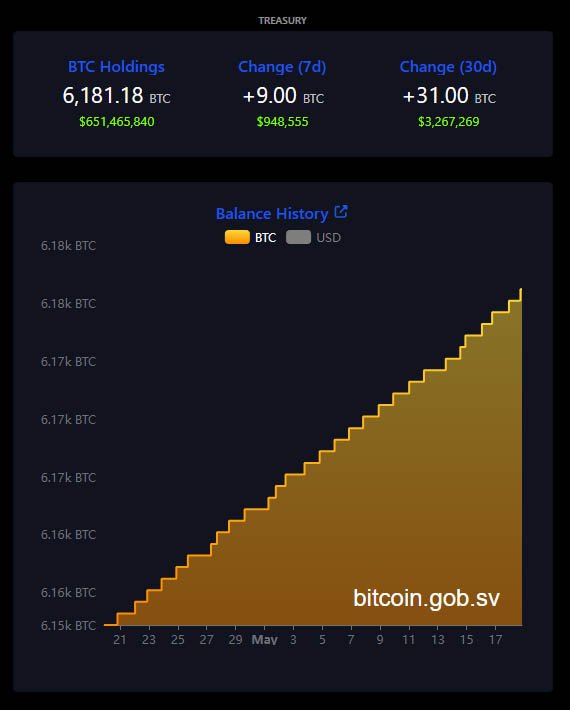
El Salvador’s bitcoin treasury — Bitcoin.gob.sv
Mizrachi’s meeting with Keiser and Herbert was about how Panama could do the same. While the details of the conversation are private, Keiser shared on social media that the two countries will play a big role in the future of Bitcoin.
“Bitcoin is transforming Central America,” Keiser wrote. “El Salvador’s geothermal & Panama’s hydro-electric will power the Bitcoin revolution.”
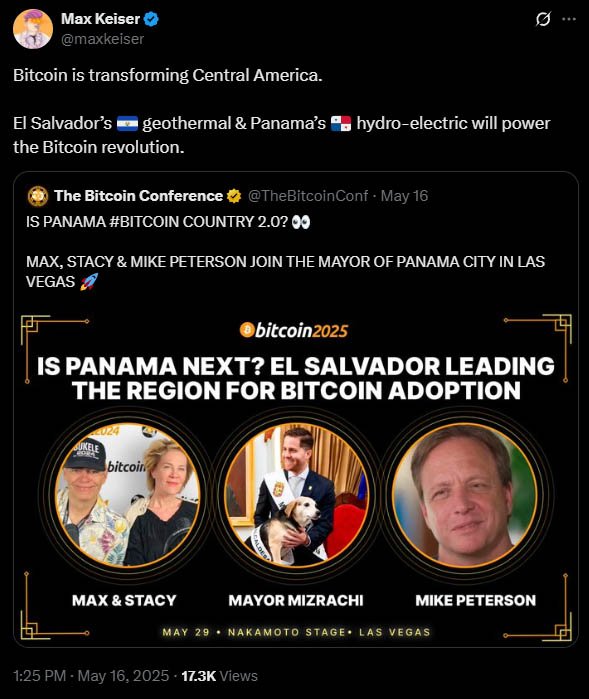
Max Keiser on X
Panama with its hydroelectric power could be a hub for green bitcoin mining.
Mizrachi has not announced a bitcoin reserve plan nor submitted a proposal to the National Assembly. But his post and public appearances suggest it’s being considered.
He will be speaking at the upcoming Bitcoin 2025 Conference in Las Vegas just days after his social media post. Many expect he will share more about Panama City’s bitcoin plans during his talk.
If Mizrachi pushes for a bitcoin reserve, he will need to work with national lawmakers to pass new legislation. So far, there is no evidence of that.
Even without a bitcoin reserve, Panama City is already going big on digital assets.
In April 2025, the city council approved a measure to allow residents to pay taxes, fees, fines and permits with digital currencies. Supported tokens are bitcoin (BTC), ethereum (ETH), USD Coin (USDC) and Tether (USDT).
To comply with financial laws, the city has partnered with a bank that instantly converts these digital assets into U.S. dollars. According to Mizrachi, this way it’s easier for residents to use digital assets and the city’s financial operations will be transparent and legal.
Another part of the meeting with El Salvador’s advisors was education.
Stacy Herbert confirmed that Panama City will be integrating El Salvador’s financial literacy book, “What is Money?” into their digital library system. The goal is to help students, teachers and the general public understand bitcoin and digital currencies in modern finance.
This is a trend in Latin America where countries are looking for alternatives to traditional banking systems. Inflation, economic instability and the rise of decentralized finance are forcing governments to look into new financial tools.
-
 @ 9ca447d2:fbf5a36d
2025-05-22 03:01:36
@ 9ca447d2:fbf5a36d
2025-05-22 03:01:36Ed Suman, a 67-year-old retired artist who helped create large sculptures like Jeff Koons’ Balloon Dog, reportedly lost his entire life savings — over $2M in digital assets — in a sophisticated scam.
The incident is believed to be tied to the major data breach at Coinbase, one of the world’s largest digital asset exchanges.
Suman’s story is part of a bigger wave of attacks on digital asset holders using stolen personal info, and has triggered lawsuits, regulatory concerns and questions about digital security in the Bitcoin space.
In March 2025, Suman got a text message about suspicious activity on his Coinbase account. After Suman reported he was unaware of any unauthorized activity regarding his account, he got a call from a man who introduced himself as Brett Miller from Coinbase Security.
The guy sounded legit — he knew Suman’s setup, including that he used a Trezor Model One hardware wallet, a device meant to keep bitcoin and other digital assets offline and safe.
Suman told Bloomberg the guy knew everything, including the exact amount of digital assets he had.
The attacker persuaded Suman that his Trezor One hardware wallet and its funds were at risk and walked him through a “security procedure” that involved entering his seed phrase into a website that looked exactly like Coinbase, in order to “link his wallet to Coinbase”.
Nine days later, another guy called and repeated the process, saying the first one didn’t work.
And then, all of Suman’s digital assets — 17.5 bitcoin and 225 ether — were gone. At the time, bitcoin was around $103,000 and ether around $2,500, so the stolen stash was worth over $2 million.
Suman turned to digital assets after retiring from a decades-long art career. He stored his assets in cold storage to avoid the risks of online exchanges. He thought he did everything right.
Suman’s attackers didn’t pick his name out of a hat.
It looks like his personal info may have been leaked in the major breach at Coinbase. The company confirmed on May 15 that some of its customer service reps in India were bribed to access internal systems and steal customer data.
The stolen data included names, phone numbers, email addresses, balances and partial Social Security numbers.
According to Coinbase’s filing with the U.S. Securities and Exchange Commission, the breach may have started as early as January and affected nearly 1% of the company’s active monthly users — tens of thousands of people.
Hackers demanded $20M from Coinbase to keep the breach quiet but the company refused to pay. Coinbase says it fired the compromised agents and is setting aside $180M to $400M to reimburse affected users.
But so far, Suman hasn’t been told if he’ll be reimbursed.
Since the breach was disclosed, Coinbase has been hit with at least six lawsuits.
The lawsuits claim the company failed to protect user data and handled the aftermath poorly. One lawsuit filed in New York federal court on May 16 says Coinbase’s response was “inadequate, fragmented, and delayed.”
“Users were not promptly or fully informed of the compromise,” the complaint states, “and Coinbase did not immediately take meaningful steps to mitigate further harm.”
Some lawsuits are seeking damages, others are asking Coinbase to purge user data and improve its security. Coinbase has not commented on the lawsuits but pointed reporters to a blog post about its response.
Suman’s case is a cautionary tale across the Bitcoin world. He used a hardware wallet (considered the gold standard of Bitcoin security) and was still tricked through social engineering. Even the strongest security is useless if you don’t understand how Bitcoin works.
It’s never too early for Bitcoiners to start learning more about Bitcoin, especially on how to keep their stash safe. And the first lesson is “never ever share your seed phrase with anyone”.
Related: Bitcoin Hardware Wallet Hacks: What You Need to Know
-
 @ 9ca447d2:fbf5a36d
2025-05-22 03:01:35
@ 9ca447d2:fbf5a36d
2025-05-22 03:01:35JPMorgan Chase, the biggest bank in the U.S., is now allowing its clients to buy bitcoin — a big change of heart for an institution whose CEO, Jamie Dimon, has been a long-time critic of the scarce digital asset.
Dimon made the announcement on the bank’s investor day, which came as a shift in JPMorgan’s approach to digital assets. “We are going to allow you to buy it,” he said. “We’re not going to custody it. We’re going to put it in statements for clients.”
That means clients can buy BTC through JPMorgan but the bank won’t hold or store the digital asset. Instead it will provide access and include the BTC purchases in client statements.
According to multiple reports and posts, JPMorgan has been blocking transactions from digital asset exchanges, with several people complaining about their experience on social media.
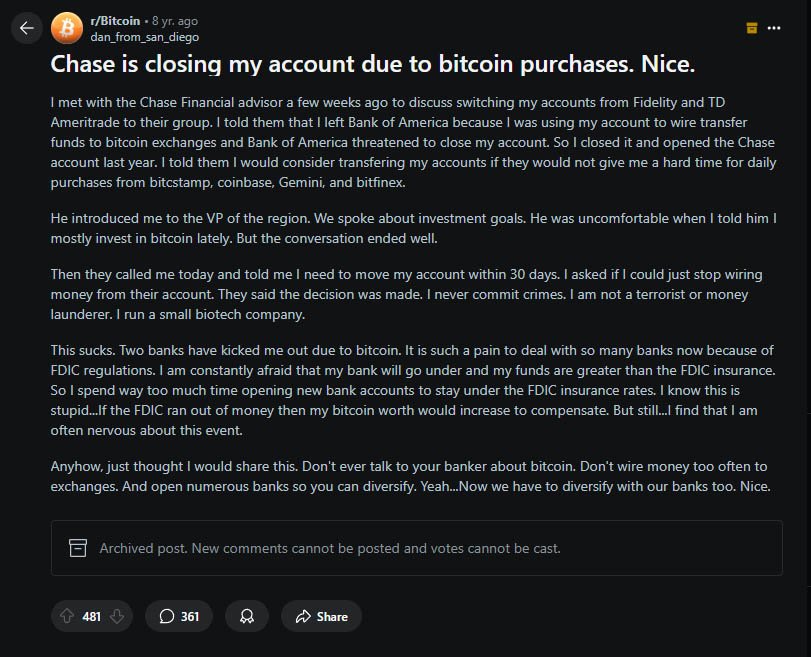
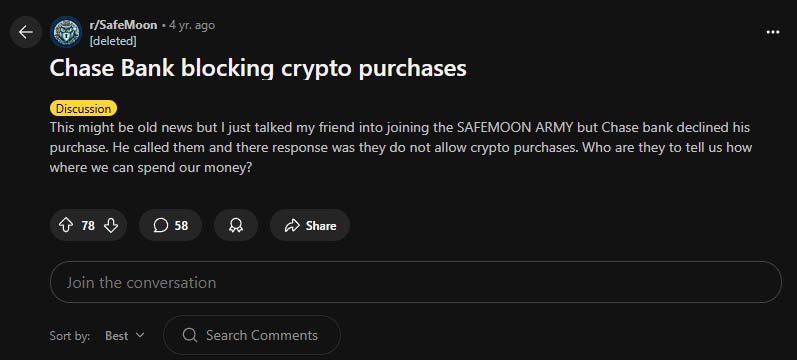
There is even an official notice on the company’s UK website that explicitly says customers cannot use their funds to purchase digital assets.
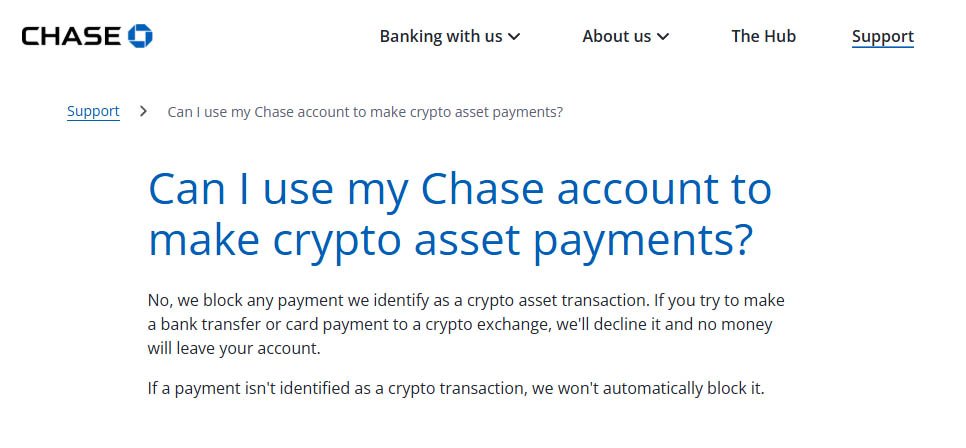
JPMorgan Chase UK website — Source
It’s a big change because Dimon has been one of Bitcoin’s biggest critics. Over the years he’s called it “worthless”, a “fraud” and even compared it to a “pet rock”.
He’s repeatedly expressed concern over digital assets’ use in illegal activities such as money laundering, terrorism, sex trafficking and tax evasion. A role that his critics say the U.S. dollar is playing on a much larger scale.
Related: Jamie Dimon Would “Close Down” Bitcoin If He Had Government Role
“The only true use case for it is criminals, drug traffickers … money laundering, tax avoidance,” he told lawmakers during a Senate hearing in 2023. At the 2024 World Economic Forum in Davos, he doubled down, “Bitcoin does nothing. I call it the pet rock.”
Despite his personal views, Dimon says the bank is responding to client demand. “I don’t think you should smoke, but I defend your right to smoke,” he said. “I defend your right to buy bitcoin.”
It’s worth noting JPMorgan isn’t fully embracing digital assets. The bank won’t be offering direct custody services or launching its own exchange.
Instead, it’s offering access to digital asset exchanges. There are even reports that the bank also plans to facilitate access to bitcoin ETFs and possibly other investment vehicles. Until recently, JPMorgan had limited its bitcoin exposure to futures-based products.
Other big financial firms have already taken similar steps.
Morgan Stanley, for example, has been offering some clients access to bitcoin ETFs since August 2024. Its CEO, Ted Pick, said earlier this year that the firm is working closely with regulators to explore ways to get into the digital assets space.
Dimon does like blockchain, though — the technology that underpins it. JPMorgan has its own blockchain projects including JPM Coin and recently ran a test transaction on a public blockchain of tokenized U.S. Treasuries.
Many criticize this view, saying that the most powerful aspect of Bitcoin is its decentralization. So, a centralized blockchain is just useless. This might be the reason Dimon has grown weary of all JPMorgan’s blockchain initiatives, because they offered nothing of value.
He said he might have given blockchain too much credit during his investor day comments: “We have been talking about blockchain for 12 to 15 years,” he said. “We spend too much on it. It doesn’t matter as much as you all think.”
-
 @ 0e9491aa:ef2adadf
2025-05-22 03:01:33
@ 0e9491aa:ef2adadf
2025-05-22 03:01:33
What is KYC/AML?
- The acronym stands for Know Your Customer / Anti Money Laundering.
- In practice it stands for the surveillance measures companies are often compelled to take against their customers by financial regulators.
- Methods differ but often include: Passport Scans, Driver License Uploads, Social Security Numbers, Home Address, Phone Number, Face Scans.
- Bitcoin companies will also store all withdrawal and deposit addresses which can then be used to track bitcoin transactions on the bitcoin block chain.
- This data is then stored and shared. Regulations often require companies to hold this information for a set number of years but in practice users should assume this data will be held indefinitely. Data is often stored insecurely, which results in frequent hacks and leaks.
- KYC/AML data collection puts all honest users at risk of theft, extortion, and persecution while being ineffective at stopping crime. Criminals often use counterfeit, bought, or stolen credentials to get around the requirements. Criminals can buy "verified" accounts for as little as $200. Furthermore, billions of people are excluded from financial services as a result of KYC/AML requirements.
During the early days of bitcoin most services did not require this sensitive user data, but as adoption increased so did the surveillance measures. At this point, most large bitcoin companies are collecting and storing massive lists of bitcoiners, our sensitive personal information, and our transaction history.
Lists of Bitcoiners
KYC/AML policies are a direct attack on bitcoiners. Lists of bitcoiners and our transaction history will inevitably be used against us.
Once you are on a list with your bitcoin transaction history that record will always exist. Generally speaking, tracking bitcoin is based on probability analysis of ownership change. Surveillance firms use various heuristics to determine if you are sending bitcoin to yourself or if ownership is actually changing hands. You can obtain better privacy going forward by using collaborative transactions such as coinjoin to break this probability analysis.
Fortunately, you can buy bitcoin without providing intimate personal information. Tools such as peach, hodlhodl, robosats, azteco and bisq help; mining is also a solid option: anyone can plug a miner into power and internet and earn bitcoin by mining privately.
You can also earn bitcoin by providing goods and/or services that can be purchased with bitcoin. Long term, circular economies will mitigate this threat: most people will not buy bitcoin - they will earn bitcoin - most people will not sell bitcoin - they will spend bitcoin.
There is no such thing as KYC or No KYC bitcoin, there are bitcoiners on lists and those that are not on lists.
If you found this post helpful support my work with bitcoin.

-
 @ 0e9491aa:ef2adadf
2025-05-22 03:01:33
@ 0e9491aa:ef2adadf
2025-05-22 03:01:33
The former seems to have found solid product market fit. Expect significant volume, adoption, and usage going forward.
The latter's future remains to be seen. Dependence on Tor, which has had massive reliability issues, and lack of strong privacy guarantees put it at risk.
— ODELL (@ODELL) October 27, 2022
The Basics
- Lightning is a protocol that enables cheap and fast native bitcoin transactions.
- At the core of the protocol is the ability for bitcoin users to create a payment channel with another user.
- These payment channels enable users to make many bitcoin transactions between each other with only two on-chain bitcoin transactions: the channel open transaction and the channel close transaction.
- Essentially lightning is a protocol for interoperable batched bitcoin transactions.
- It is expected that on chain bitcoin transaction fees will increase with adoption and the ability to easily batch transactions will save users significant money.
- As these lightning transactions are processed, liquidity flows from one side of a channel to the other side, on chain transactions are signed by both parties but not broadcasted to update this balance.
- Lightning is designed to be trust minimized, either party in a payment channel can close the channel at any time and their bitcoin will be settled on chain without trusting the other party.
There is no 'Lightning Network'
- Many people refer to the aggregate of all lightning channels as 'The Lightning Network' but this is a false premise.
- There are many lightning channels between many different users and funds can flow across interconnected channels as long as there is a route through peers.
- If a lightning transaction requires multiple hops it will flow through multiple interconnected channels, adjusting the balance of all channels along the route, and paying lightning transaction fees that are set by each node on the route.
Example: You have a channel with Bob. Bob has a channel with Charlie. You can pay Charlie through your channel with Bob and Bob's channel with User C.
- As a result, it is not guaranteed that every lightning user can pay every other lightning user, they must have a route of interconnected channels between sender and receiver.
Lightning in Practice
- Lightning has already found product market fit and usage as an interconnected payment protocol between large professional custodians.
- They are able to easily manage channels and liquidity between each other without trust using this interoperable protocol.
- Lightning payments between large custodians are fast and easy. End users do not have to run their own node or manage their channels and liquidity. These payments rarely fail due to professional management of custodial nodes.
- The tradeoff is one inherent to custodians and other trusted third parties. Custodial wallets can steal funds and compromise user privacy.
Sovereign Lightning
- Trusted third parties are security holes.
- Users must run their own node and manage their own channels in order to use lightning without trusting a third party. This remains the single largest friction point for sovereign lightning usage: the mental burden of actively running a lightning node and associated liquidity management.
- Bitcoin development prioritizes node accessibility so cost to self host your own node is low but if a node is run at home or office, Tor or a VPN is recommended to mask your IP address: otherwise it is visible to the entire network and represents a privacy risk.
- This privacy risk is heightened due to the potential for certain governments to go after sovereign lightning users and compel them to shutdown their nodes. If their IP Address is exposed they are easier to target.
- Fortunately the tools to run and manage nodes continue to get easier but it is important to understand that this will always be a friction point when compared to custodial services.
The Potential Fracture of Lightning
- Any lightning user can choose which users are allowed to open channels with them.
- One potential is that professional custodians only peer with other professional custodians.
- We already see nodes like those run by CashApp only have channels open with other regulated counterparties. This could be due to performance goals, liability reduction, or regulatory pressure.
- Fortunately some of their peers are connected to non-regulated parties so payments to and from sovereign lightning users are still successfully processed by CashApp but this may not always be the case going forward.
Summary
- Many people refer to the aggregate of all lightning channels as 'The Lightning Network' but this is a false premise. There is no singular 'Lightning Network' but rather many payment channels between distinct peers, some connected with each other and some not.
- Lightning as an interoperable payment protocol between professional custodians seems to have found solid product market fit. Expect significant volume, adoption, and usage going forward.
- Lightning as a robust sovereign payment protocol has yet to be battle tested. Heavy reliance on Tor, which has had massive reliability issues, the friction of active liquidity management, significant on chain fee burden for small amounts, interactivity constraints on mobile, and lack of strong privacy guarantees put it at risk.
If you have never used lightning before, use this guide to get started on your phone.
If you found this post helpful support my work with bitcoin.

-
 @ 0e9491aa:ef2adadf
2025-05-22 03:01:32
@ 0e9491aa:ef2adadf
2025-05-22 03:01:32
Bank run on every crypto bank then bank run on every "real" bank.
— ODELL (@ODELL) December 14, 2022
The four main banks of bitcoin and “crypto” are Signature, Prime Trust, Silvergate, and Silicon Valley Bank. Prime Trust does not custody funds themselves but rather maintains deposit accounts at BMO Harris Bank, Cross River, Lexicon Bank, MVB Bank, and Signature Bank. Silvergate and Silicon Valley Bank have already stopped withdrawals. More banks will go down before the chaos stops. None of them have sufficient reserves to meet withdrawals.
Bitcoin gives us all the ability to opt out of a system that has massive layers of counterparty risk built in, years of cheap money and broken incentives have layered risk on top of risk throughout the entire global economy. If you thought the FTX bank run was painful to watch, I have bad news for you: every major bank in the world is fractional reserve. Bitcoin held in self custody is unique in its lack of counterparty risk, as global market chaos unwinds this will become much more obvious.
The rules of bitcoin are extremely hard to change by design. Anyone can access the network directly without a trusted third party by using their own node. Owning more bitcoin does not give you more control over the network with all participants on equal footing.
Bitcoin is:
- money that is not controlled by a company or government
- money that can be spent or saved without permission
- money that is provably scarce and should increase in purchasing power with adoptionBitcoin is money without trust. Whether you are a nation state, corporation, or an individual, you can use bitcoin to spend or save without permission. Social media will accelerate the already deteriorating trust in our institutions and as this trust continues to crumble the value of trust minimized money will become obvious. As adoption increases so should the purchasing power of bitcoin.
A quick note on "stablecoins," such as USDC - it is important to remember that they rely on trusted custodians. They have the same risk as funds held directly in bank accounts with additional counterparty risk on top. The trusted custodians can be pressured by gov, exit scam, or caught up in fraud. Funds can and will be frozen at will. This is a distinctly different trust model than bitcoin, which is a native bearer token that does not rely on any centralized entity or custodian.
Most bitcoin exchanges have exposure to these failing banks. Expect more chaos and confusion as this all unwinds. Withdraw any bitcoin to your own wallet ASAP.
Simple Self Custody Guide: https://werunbtc.com/muun
More Secure Cold Storage Guide: https://werunbtc.com/coldcard
If you found this post helpful support my work with bitcoin.

-
 @ 0e9491aa:ef2adadf
2025-05-22 03:01:32
@ 0e9491aa:ef2adadf
2025-05-22 03:01:32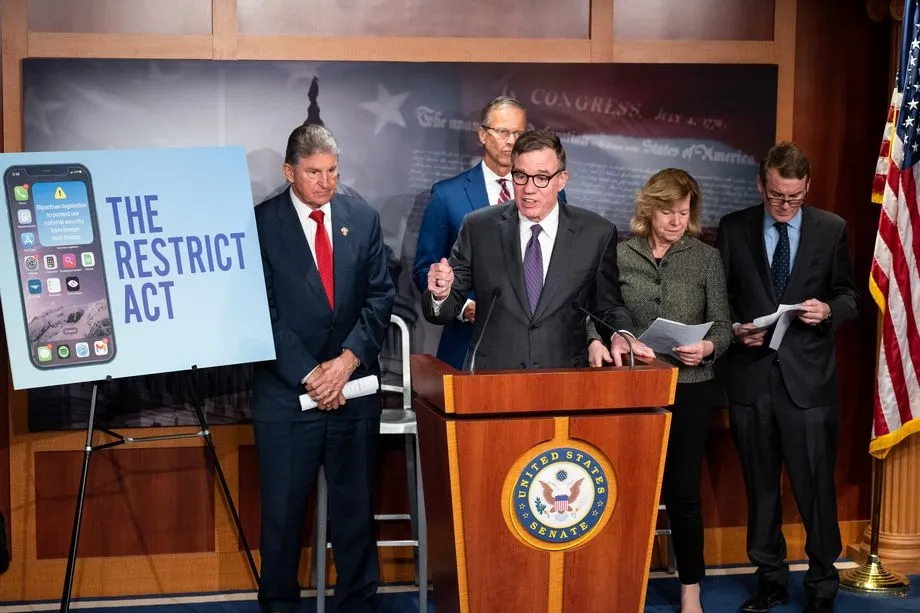
The newly proposed RESTRICT ACT - is being advertised as a TikTok Ban, but is much broader than that, carries a $1M Fine and up to 20 years in prison️! It is unconstitutional and would create massive legal restrictions on the open source movement and free speech throughout the internet.
The Bill was proposed by: Senator Warner, Senator Thune, Senator Baldwin, Senator Fischer, Senator Manchin, Senator Moran, Senator Bennet, Senator Sullivan, Senator Gillibrand, Senator Collins, Senator Heinrich, and Senator Romney. It has broad support across Senators of both parties.
Corrupt politicians will not protect us. They are part of the problem. We must build, support, and learn how to use censorship resistant tools in order to defend our natural rights.
The RESTRICT Act, introduced by Senators Warner and Thune, aims to block or disrupt transactions and financial holdings involving foreign adversaries that pose risks to national security. Although the primary targets of this legislation are companies like Tik-Tok, the language of the bill could potentially be used to block or disrupt cryptocurrency transactions and, in extreme cases, block Americans’ access to open source tools or protocols like Bitcoin.
The Act creates a redundant regime paralleling OFAC without clear justification, it significantly limits the ability for injured parties to challenge actions raising due process concerns, and unlike OFAC it lacks any carve-out for protected speech. COINCENTER ON THE RESTRICT ACT
If you found this post helpful support my work with bitcoin.

-
 @ 0e9491aa:ef2adadf
2025-05-22 03:01:32
@ 0e9491aa:ef2adadf
2025-05-22 03:01:32
@matt_odell don't you even dare not ask about nostr!
— Kukks (Andrew Camilleri) (@MrKukks) May 18, 2021
Nostr first hit my radar spring 2021: created by fellow bitcoiner and friend, fiatjaf, and released to the world as free open source software. I was fortunate to be able to host a conversation with him on Citadel Dispatch in those early days, capturing that moment in history forever. Since then, the protocol has seen explosive viral organic growth as individuals around the world have contributed their time and energy to build out the protocol and the surrounding ecosystem due to the clear need for better communication tools.
nostr is to twitter as bitcoin is to paypal
As an intro to nostr, let us start with a metaphor:
twitter is paypal - a centralized platform plagued by censorship but has the benefit of established network effects
nostr is bitcoin - an open protocol that is censorship resistant and robust but requires an organic adoption phase
Nostr is an open communication protocol that can be used to send messages across a distributed set of relays in a censorship resistant and robust way.
- Anyone can run a relay.
- Anyone can interact with the protocol.
- Relays can choose which messages they want to relay.
- Users are identified by a simple public private key pair that they can generate themselves.Nostr is often compared to twitter since there are nostr clients that emulate twitter functionality and user interface but that is merely one application of the protocol. Nostr is so much more than a mere twitter competitor. Nostr clients and relays can transmit a wide variety of data and clients can choose how to display that information to users. The result is a revolution in communication with implications that are difficult for any of us to truly comprehend.
Similar to bitcoin, nostr is an open and permissionless protocol. No person, company, or government controls it. Anyone can iterate and build on top of nostr without permission. Together, bitcoin and nostr are incredibly complementary freedom tech tools: censorship resistant, permissionless, robust, and interoperable - money and speech protected by code and incentives, not laws.
As censorship throughout the world continues to escalate, freedom tech provides hope for individuals around the world who refuse to accept the status quo. This movement will succeed on the shoulders of those who choose to stand up and contribute. We will build our own path. A brighter path.
My Nostr Public Key: npub1qny3tkh0acurzla8x3zy4nhrjz5zd8l9sy9jys09umwng00manysew95gx
If you found this post helpful support my work with bitcoin.

-
 @ 0e9491aa:ef2adadf
2025-05-22 03:01:32
@ 0e9491aa:ef2adadf
2025-05-22 03:01:32

"Privacy is necessary for an open society in the electronic age. Privacy is not secrecy. A private matter is something one doesn't want the whole world to know, but a secret matter is something one doesn't want anybody to know. Privacy is the power to selectively reveal oneself to the world." - Eric Hughes, A Cypherpunk's Manifesto, 1993
Privacy is essential to freedom. Without privacy, individuals are unable to make choices free from surveillance and control. Lack of privacy leads to loss of autonomy. When individuals are constantly monitored it limits our ability to express ourselves and take risks. Any decisions we make can result in negative repercussions from those who surveil us. Without the freedom to make choices, individuals cannot truly be free.
Freedom is essential to acquiring and preserving wealth. When individuals are not free to make choices, restrictions and limitations prevent us from economic opportunities. If we are somehow able to acquire wealth in such an environment, lack of freedom can result in direct asset seizure by governments or other malicious entities. At scale, when freedom is compromised, it leads to widespread economic stagnation and poverty. Protecting freedom is essential to economic prosperity.
The connection between privacy, freedom, and wealth is critical. Without privacy, individuals lose the freedom to make choices free from surveillance and control. While lack of freedom prevents individuals from pursuing economic opportunities and makes wealth preservation nearly impossible. No Privacy? No Freedom. No Freedom? No Wealth.
Rights are not granted. They are taken and defended. Rights are often misunderstood as permission to do something by those holding power. However, if someone can give you something, they can inherently take it from you at will. People throughout history have necessarily fought for basic rights, including privacy and freedom. These rights were not given by those in power, but rather demanded and won through struggle. Even after these rights are won, they must be continually defended to ensure that they are not taken away. Rights are not granted - they are earned through struggle and defended through sacrifice.
If you found this post helpful support my work with bitcoin.

-
 @ 0e9491aa:ef2adadf
2025-05-22 03:01:31
@ 0e9491aa:ef2adadf
2025-05-22 03:01:31
People forget Bear Stearns failed March 2008 - months of denial followed before the public realized how bad the situation was under the surface.
Similar happening now but much larger scale. They did not fix fundamental issues after 2008 - everything is more fragile.
The Fed preemptively bailed out every bank with their BTFP program and First Republic Bank still failed. The second largest bank failure in history.
There will be more failures. There will be more bailouts. Depositors will be "protected" by socializing losses across everyone.
Our President and mainstream financial pundits are currently pretending the banking crisis is over while most banks remain insolvent. There are going to be many more bank failures as this ponzi system unravels.
Unlike 2008, we have the ability to opt out of these broken and corrupt institutions by using bitcoin. Bitcoin held in self custody is unique in its lack of counterparty risk - you do not have to trust a bank or other centralized entity to hold it for you. Bitcoin is also incredibly difficult to change by design since it is not controlled by an individual, company, or government - the supply of dollars will inevitably be inflated to bailout these failing banks but bitcoin supply will remain unchanged. I do not need to convince you that bitcoin provides value - these next few years will convince millions.
If you found this post helpful support my work with bitcoin.

-
 @ 0e9491aa:ef2adadf
2025-05-22 03:01:31
@ 0e9491aa:ef2adadf
2025-05-22 03:01:31
Bank run on every crypto bank then bank run on every "real" bank.
— ODELL (@ODELL) December 14, 2022
Good morning.
It looks like PacWest will fail today. It will be both the fifth largest bank failure in US history and the sixth major bank to fail this year. It will likely get purchased by one of the big four banks in a government orchestrated sale.
March 8th - Silvergate Bank
March 10th - Silicon Valley Bank
March 12th - Signature Bank
March 19th - Credit Suisse
May 1st - First Republic Bank
May 4th - PacWest Bank?PacWest is the first of many small regional banks that will go under this year. Most will get bought by the big four in gov orchestrated sales. This has been the playbook since 2008. Follow the incentives. Massive consolidation across the banking industry. PacWest gonna be a drop in the bucket compared to what comes next.
First, a hastened government led bank consolidation, then a public/private partnership with the remaining large banks to launch a surveilled and controlled digital currency network. We will be told it is more convenient. We will be told it is safer. We will be told it will prevent future bank runs. All of that is marketing bullshit. The goal is greater control of money. The ability to choose how we spend it and how we save it. If you control the money - you control the people that use it.
If you found this post helpful support my work with bitcoin.

-
 @ 0e9491aa:ef2adadf
2025-05-22 03:01:31
@ 0e9491aa:ef2adadf
2025-05-22 03:01:31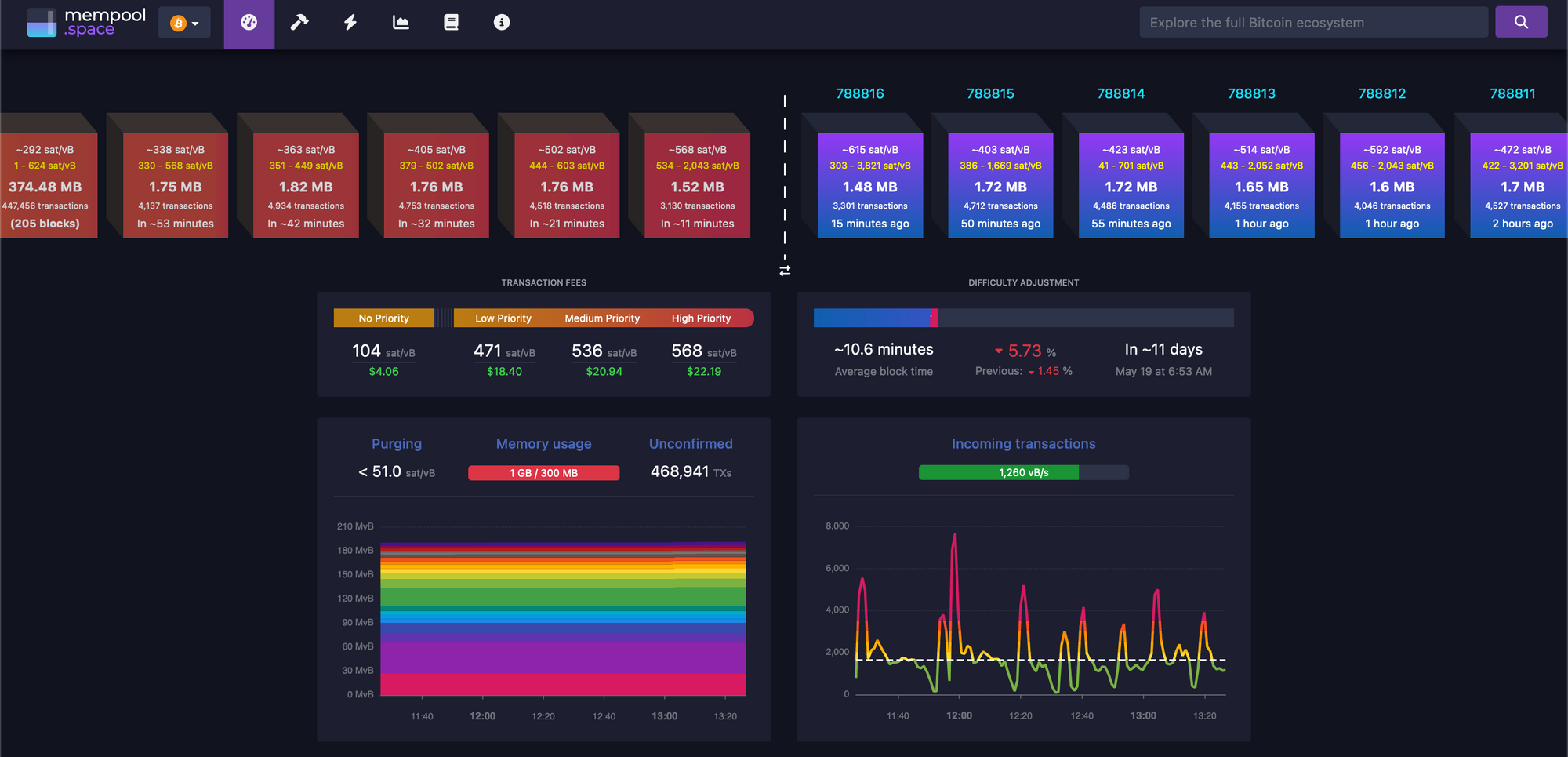
There must be a limit to how much data is transferred across the bitcoin network in order to keep the ability to run and use your own node accessible. A node is required to interact with the global bitcoin network - if you do not use your own node then you must trust someone else's node. If nodes become inaccessible to run then the network will centralize around the remaining entities that operate them - threatening the censorship resistance at the core of bitcoin's value prop. The bitcoin protocol uses three main mechanisms to keep node operation costs low - a fixed limit on the amount of data in each block, an automatic difficulty adjustment that regulates how many blocks are produced based on current mining hash rate, and a robust dynamic transaction fee market.
Bitcoin transaction fees limit network abuse by making usage expensive. There is a cost to every transaction, set by a dynamic free market based on demand for scarce block space. It is an incredibly robust way to prevent spam without relying on centralized entities that can be corrupted or pressured.
After the 2017 bitcoin fee spike we had six years of relative quiet to build tools that would be robust in a sustained high fee market. Fortunately our tools are significantly better now but many still need improvement. Most of the pain points we see today will be mitigated.
The reality is we were never going to be fully prepared - pressure is needed to show the pain points and provide strong incentives to mitigate them.
It will be incredibly interesting to watch how projects adapt under pressure. Optimistic we see great innovation here.
_If you are willing to wait for your transaction to confirm you can pay significantly lower fees. Learn best practices for reducing your fee burden here.
My guide for running and using your own bitcoin node can be found here._
If you found this post helpful support my work with bitcoin.

-
 @ 0e9491aa:ef2adadf
2025-05-22 03:01:31
@ 0e9491aa:ef2adadf
2025-05-22 03:01:31
I often hear "bitcoin doesn't interest me, I'm not a finance person."
Ironically, the beauty of sound money is you don't have to be. In the current system you're expected to manage a diversified investment portfolio or pay someone to do it. Bitcoin will make that optional.
— ODELL (@ODELL) September 16, 2018
At first glance bitcoin often appears overwhelming to newcomers. It is incredibly easy to get bogged down in the details of how it works or different ways to use it. Enthusiasts, such as myself, often enjoy going down the deep rabbit hole of the potential of bitcoin, possible pitfalls and theoretical scenarios, power user techniques, and the developer ecosystem. If your first touch point with bitcoin is that type of content then it is only natural to be overwhelmed. While it is important that we have a thriving community of bitcoiners dedicated to these complicated tasks - the true beauty of bitcoin lies in its simplicity. Bitcoin is simply better money. It is the best money we have ever had.
Life is complicated. Life is hard. Life is full of responsibility and surprises. Bitcoin allows us to focus on our lives while relying on a money that is simple. A money that is not controlled by any individual, company, or government. A money that cannot be easily seized or blocked. A money that cannot be devalued at will by a handful of corrupt bureaucrat who live hundreds of miles from us. A money that can be easily saved and should increase in purchasing power over time without having to learn how to "build a diversified stock portfolio" or hire someone to do it for us.
Bitcoin enables all of us to focus on our lives - our friends and family - doing what we love with the short time we have on this earth. Time is scarce. Life is complicated. Bitcoin is the most simple aspect of our complicated lives. If we spend our scarce time working then we should be able to easily save that accrued value for future generations without watching the news or understanding complicated financial markets. Bitcoin makes this possible for anyone.
Yesterday was Mother's Day. Raising a human is complicated. It is hard, it requires immense personal responsibility, it requires critical thinking, but mothers figure it out, because it is worth it. Using and saving bitcoin is simple - simply install an app on your phone. Every mother can do it. Every person can do it.
Life is complicated. Life is beautiful. Bitcoin is simple.
If you found this post helpful support my work with bitcoin.

-
 @ 0e9491aa:ef2adadf
2025-05-22 03:01:30
@ 0e9491aa:ef2adadf
2025-05-22 03:01:30Will not live in a pod.
Will not eat the bugs.
Will not get the chip.
Will not get a blue check.
Will not use CBDCs.Live Free or Die.
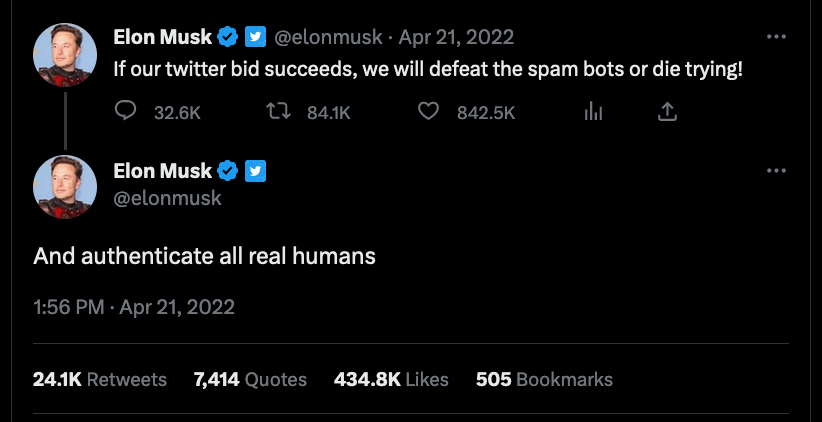
Why did Elon buy twitter for $44 Billion? What value does he see in it besides the greater influence that undoubtedly comes with controlling one of the largest social platforms in the world? We do not need to speculate - he made his intentions incredibly clear in his first meeting with twitter employees after his takeover - WeChat of the West.
To those that do not appreciate freedom, the value prop is clear - WeChat is incredibly powerful and successful in China.
To those that do appreciate freedom, the concern is clear - WeChat has essentially become required to live in China, has surveillance and censorship integrated at its core, and if you are banned from the app your entire livelihood is at risk. Employment, housing, payments, travel, communication, and more become extremely difficult if WeChat censors determine you have acted out of line.
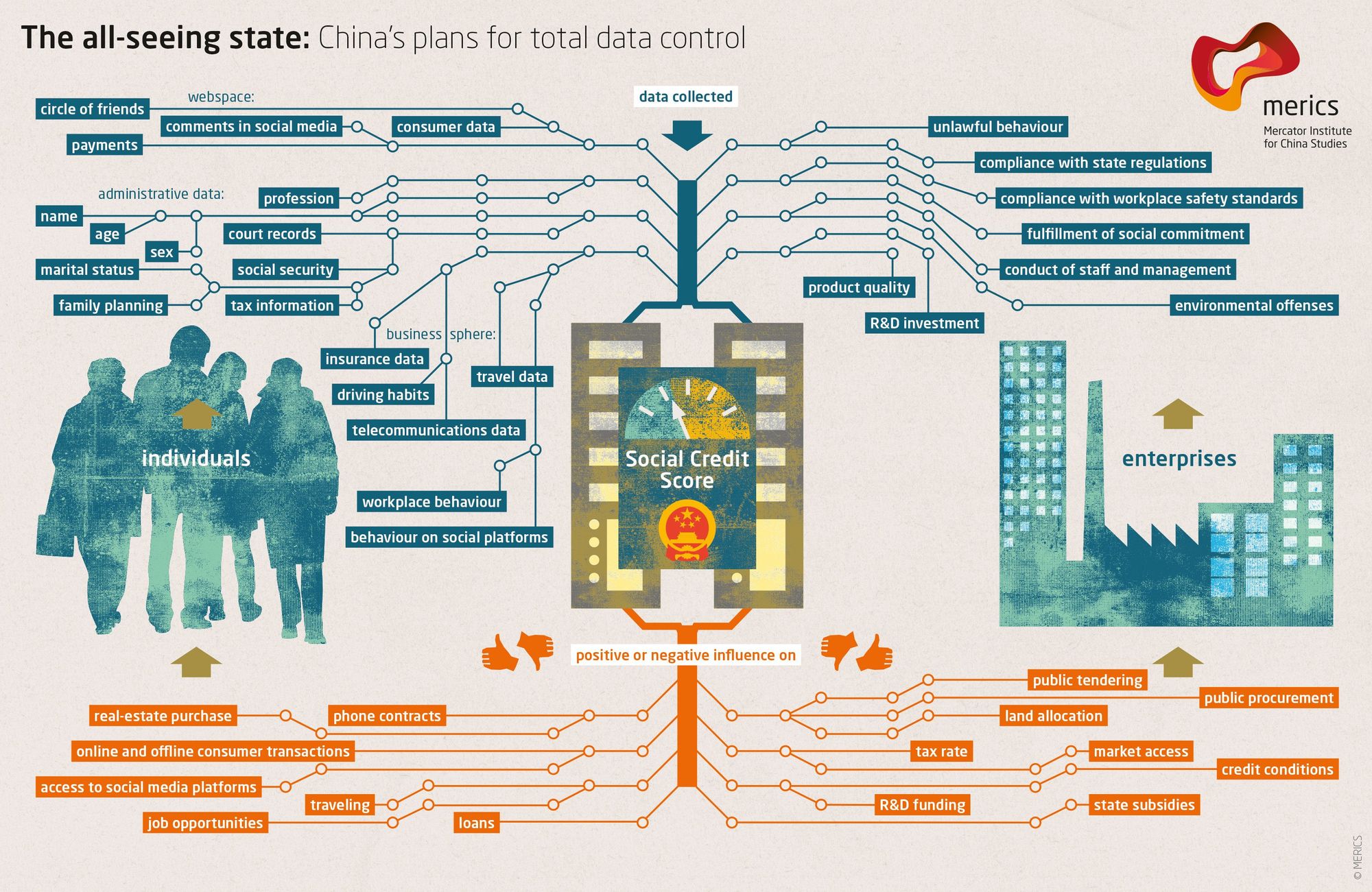
The blue check is the first step in Elon's plan to bring the chinese social credit score system to the west. Users who verify their identity are rewarded with more reach and better tools than those that do not. Verified users are the main product of Elon's twitter - an extensive database of individuals and complete control of the tools he will slowly get them to rely on - it is easier to monetize cattle than free men.
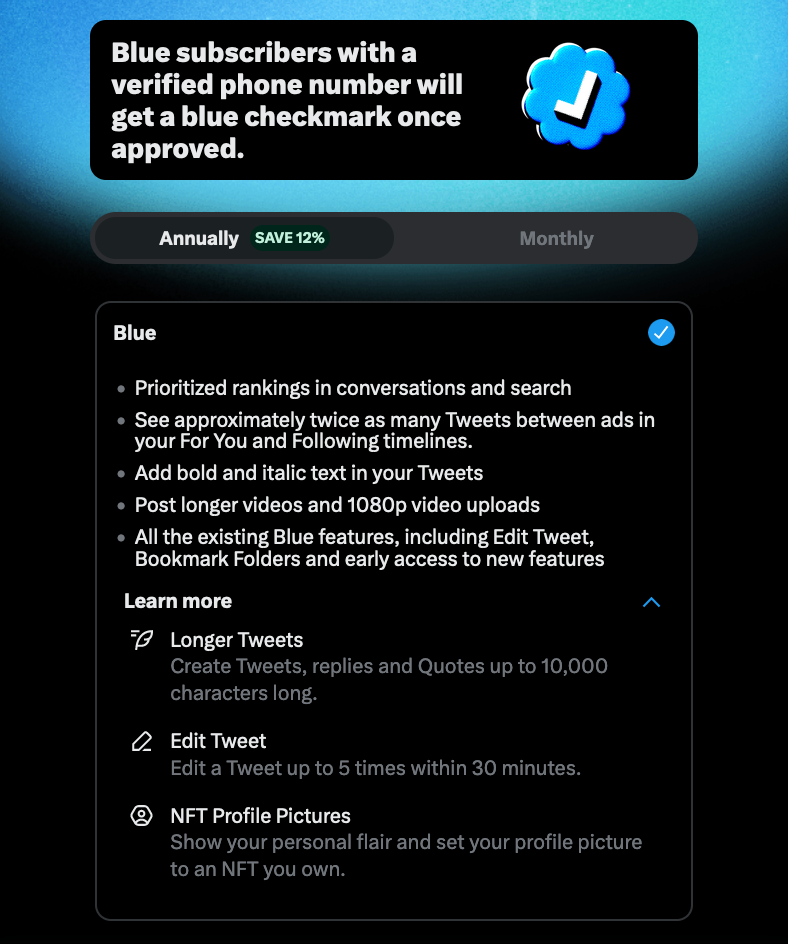
If you cannot resist the temptation of the blue check in its current form you have already lost - what comes next will be much darker. If you realize the need to resist - freedom tech provides us options.
If you found this post helpful support my work with bitcoin.

-
 @ 0e9491aa:ef2adadf
2025-05-22 03:01:30
@ 0e9491aa:ef2adadf
2025-05-22 03:01:30
Nostr is an open communication protocol that can be used to send messages across a distributed set of relays in a censorship resistant and robust way.
If you missed my nostr introduction post you can find it here. My nostr account can be found here.
We are nearly at the point that if something interesting is posted on a centralized social platform it will usually be posted by someone to nostr.
We are nearly at the point that if something interesting is posted exclusively to nostr it is cross posted by someone to various centralized social platforms.
We are nearly at the point that you can recommend a cross platform app that users can install and easily onboard without additional guides or resources.
As companies continue to build walls around their centralized platforms nostr posts will be the easiest to cross reference and verify - as companies continue to censor their users nostr is the best censorship resistant alternative - gradually then suddenly nostr will become the standard. 🫡
Current Nostr Stats
If you found this post helpful support my work with bitcoin.

-
 @ 0e9491aa:ef2adadf
2025-05-22 03:01:30
@ 0e9491aa:ef2adadf
2025-05-22 03:01:30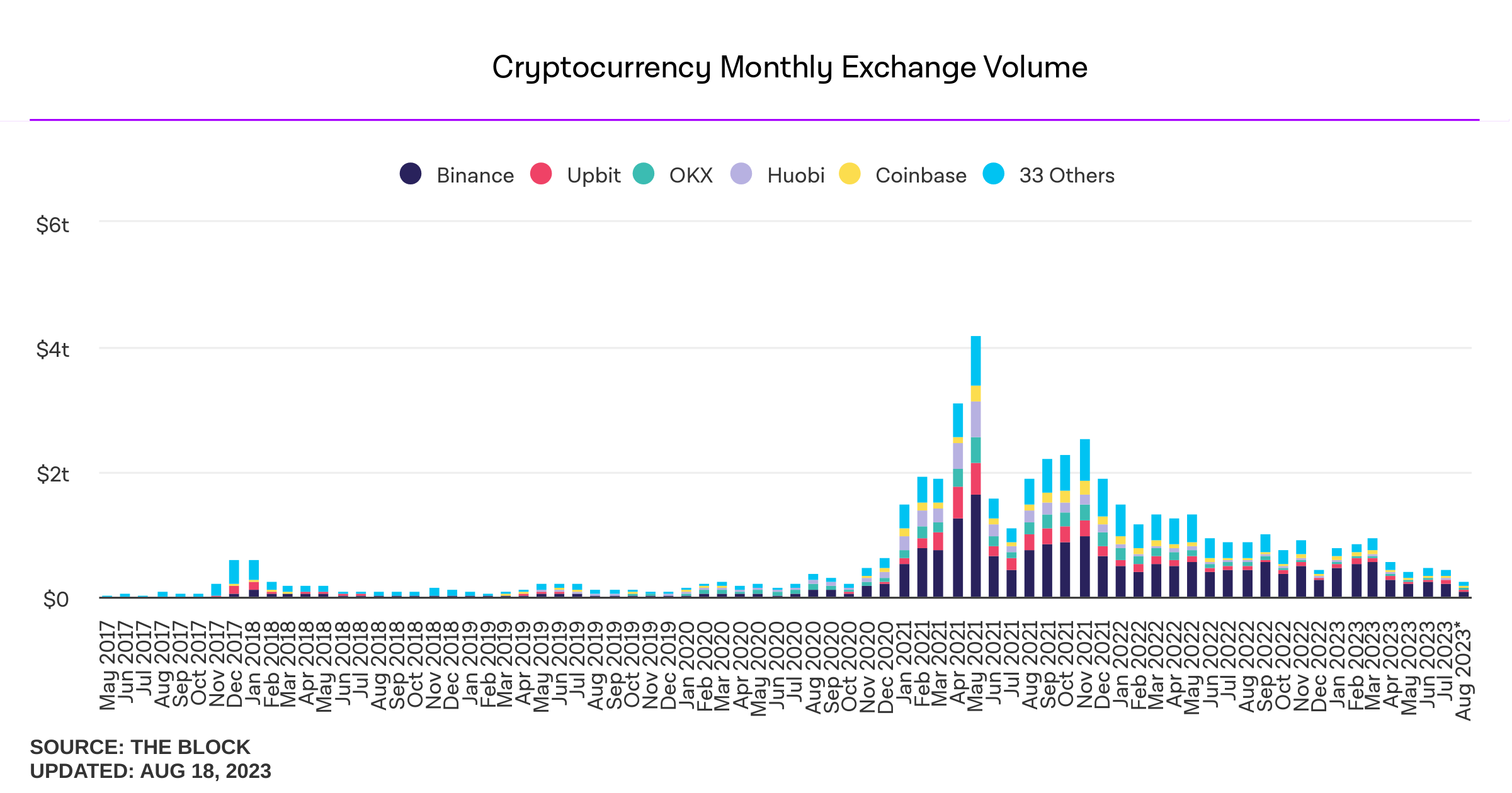
Influencers would have you believe there is an ongoing binance bank run but bitcoin wallet data says otherwise.
- binance wallets are near all time highs
- bitfinex wallets are also trending up
- gemini and coinbase are being hit with massive withdrawals thoughYou should not trust custodians, they can rug you without warning. It is incredibly important you learn how to hold bitcoin yourself, but also consider not blindly trusting influencers with a ref link to shill you.
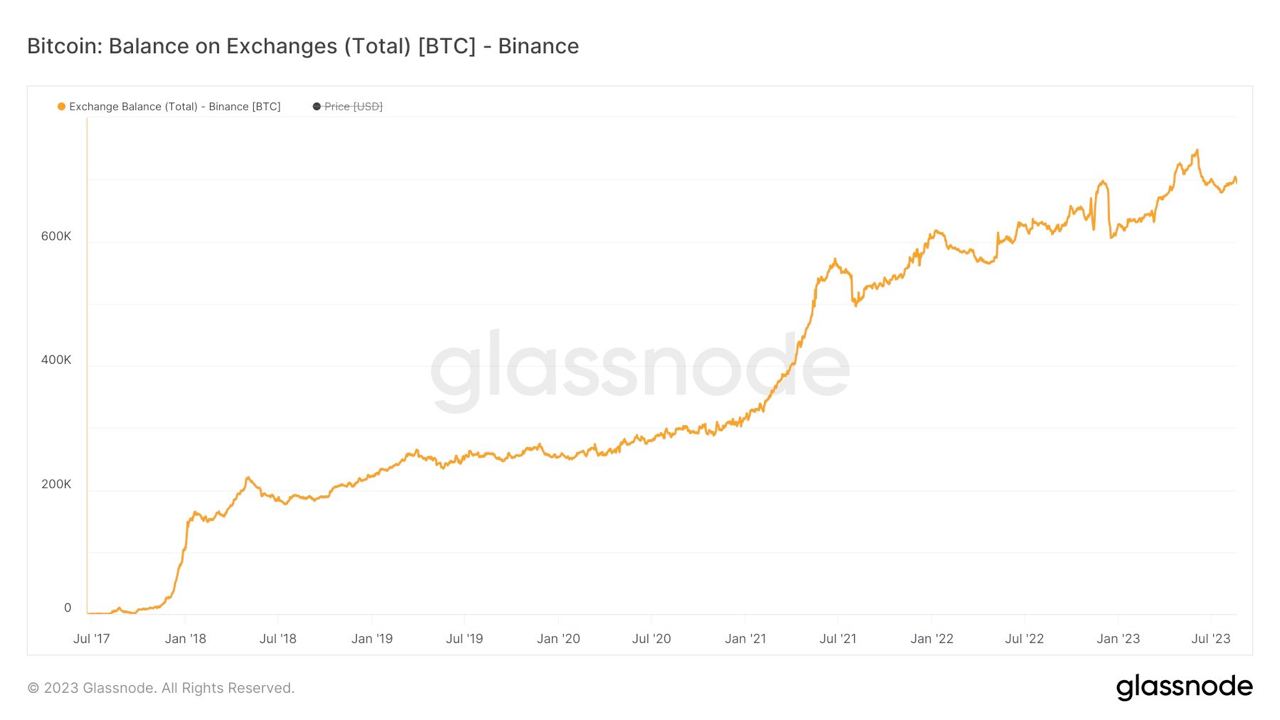
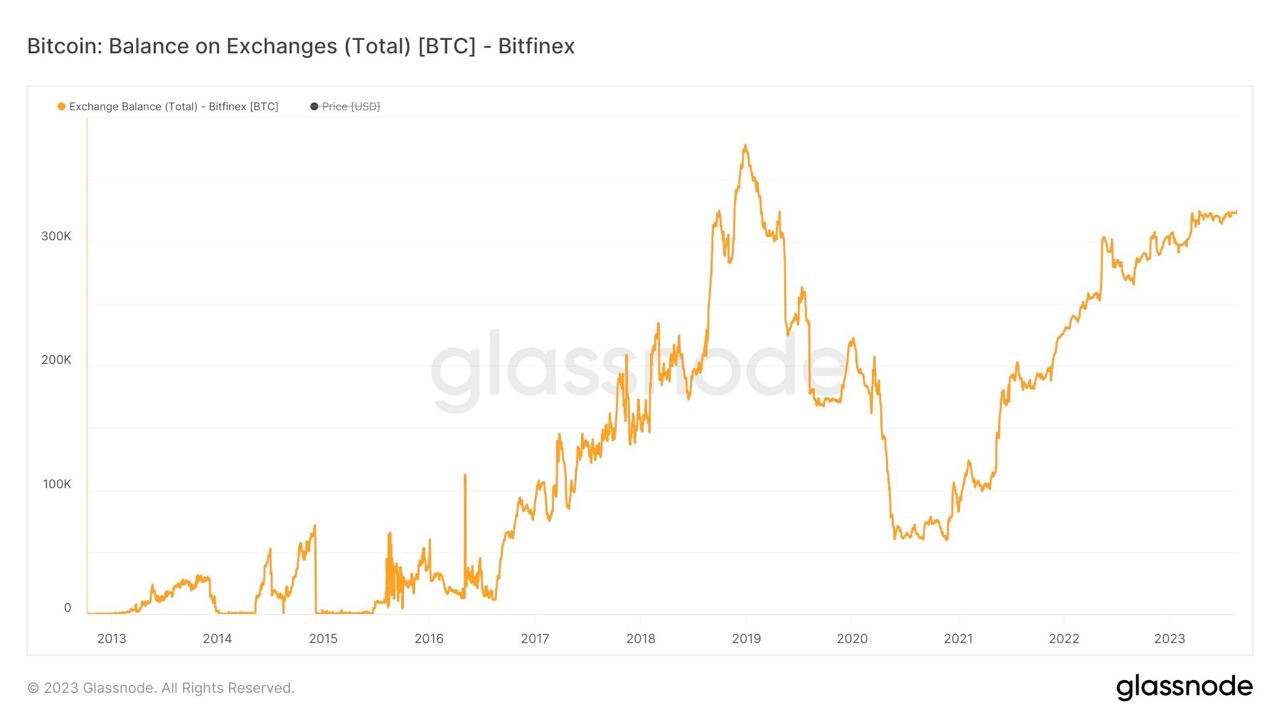
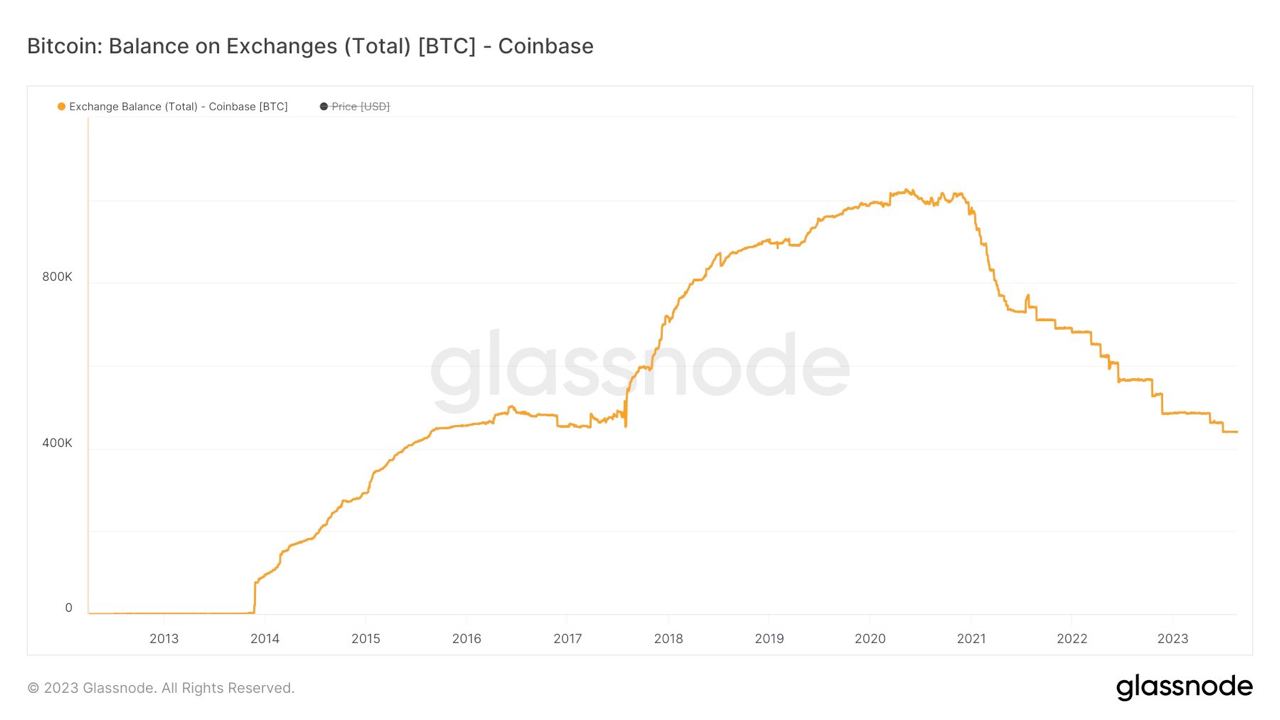
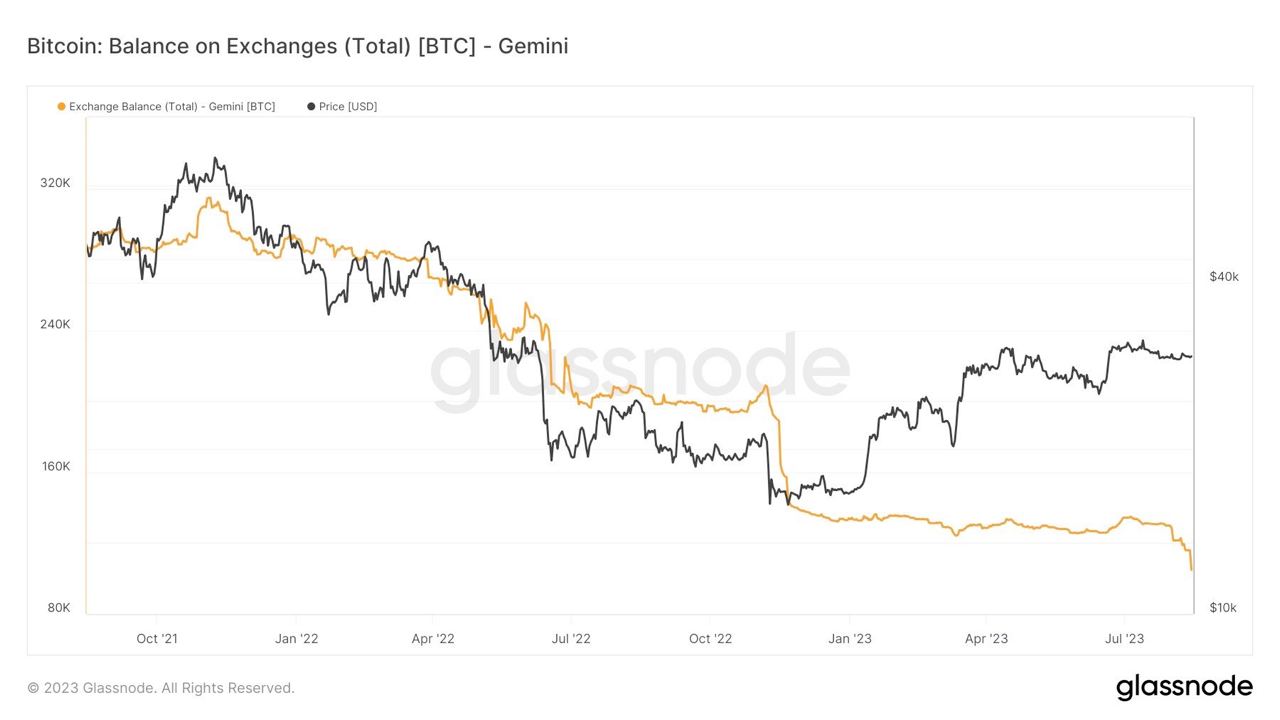
If you found this post helpful support my work with bitcoin.

-
 @ 0e9491aa:ef2adadf
2025-05-22 03:01:30
@ 0e9491aa:ef2adadf
2025-05-22 03:01:30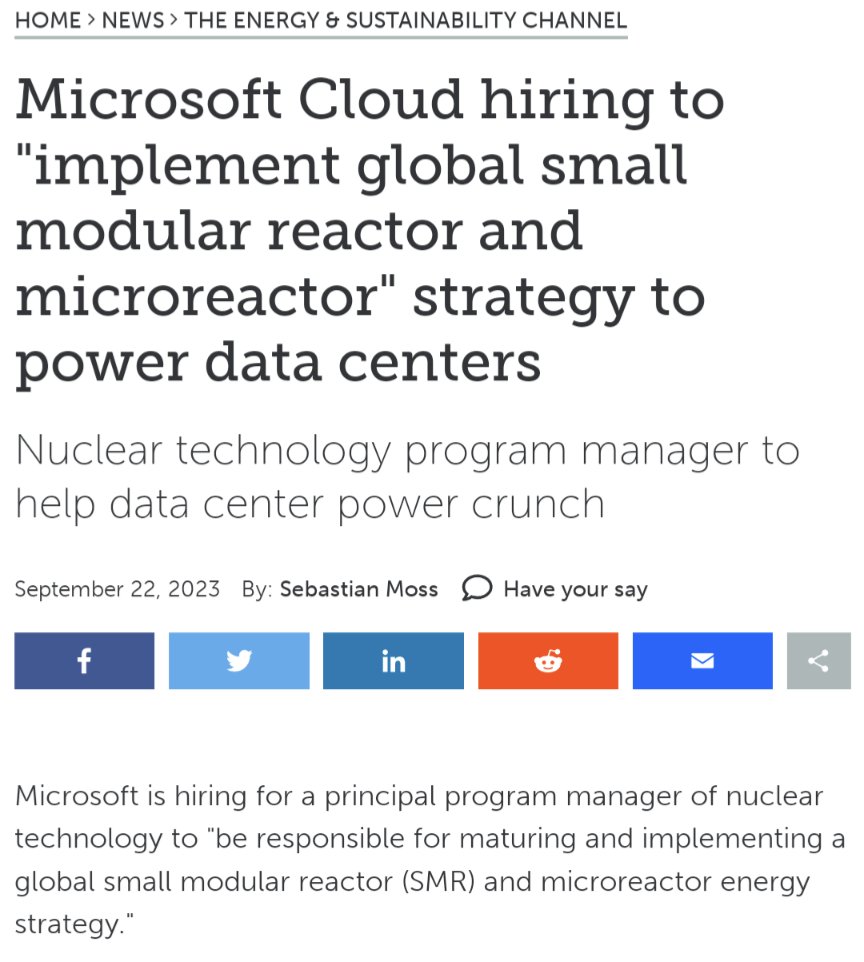
For years American bitcoin miners have argued for more efficient and free energy markets. It benefits everyone if our energy infrastructure is as efficient and robust as possible. Unfortunately, broken incentives have led to increased regulation throughout the sector, incentivizing less efficient energy sources such as solar and wind at the detriment of more efficient alternatives.
The result has been less reliable energy infrastructure for all Americans and increased energy costs across the board. This naturally has a direct impact on bitcoin miners: increased energy costs make them less competitive globally.
Bitcoin mining represents a global energy market that does not require permission to participate. Anyone can plug a mining computer into power and internet to get paid the current dynamic market price for their work in bitcoin. Using cellphone or satellite internet, these mines can be located anywhere in the world, sourcing the cheapest power available.
Absent of regulation, bitcoin mining naturally incentivizes the build out of highly efficient and robust energy infrastructure. Unfortunately that world does not exist and burdensome regulations remain the biggest threat for US based mining businesses. Jurisdictional arbitrage gives miners the option of moving to a friendlier country but that naturally comes with its own costs.
Enter AI. With the rapid development and release of AI tools comes the requirement of running massive datacenters for their models. Major tech companies are scrambling to secure machines, rack space, and cheap energy to run full suites of AI enabled tools and services. The most valuable and powerful tech companies in America have stumbled into an accidental alliance with bitcoin miners: THE NEED FOR CHEAP AND RELIABLE ENERGY.
Our government is corrupt. Money talks. These companies will push for energy freedom and it will greatly benefit us all.
Microsoft Cloud hiring to "implement global small modular reactor and microreactor" strategy to power data centers: https://www.datacenterdynamics.com/en/news/microsoft-cloud-hiring-to-implement-global-small-modular-reactor-and-microreactor-strategy-to-power-data-centers/
If you found this post helpful support my work with bitcoin.

-
 @ 0e9491aa:ef2adadf
2025-05-22 03:01:29
@ 0e9491aa:ef2adadf
2025-05-22 03:01:29
Humanity's Natural State Is Chaos
Without order there is chaos. Humans competing with each other for scarce resources naturally leads to conflict until one group achieves significant power and instates a "monopoly on violence."Power Brings Stability
Power has always been the key means to achieve stability in societies. Centralized power can be incredibly effective in addressing issues such as crime, poverty, and social unrest efficiently. Unfortunately this power is often abused and corrupted.Centralized Power Breeds Tyranny
Centralized power often leads to tyrannical rule. When a select few individuals hold control over a society, they tend to become corrupted. Centralized power structures often lack accountability and transparency, and rely too heavily on trust.Distributed Power Cultivates Freedom
New technology that empowers individuals provide us the ability to rebuild societies from the bottom up. Strong individuals that can defend and provide for themselves will help build strong local communities on a similar foundation. The result is power being distributed throughout society rather than held by a select few.In the short term, relying on trust and centralized power is an easy answer to mitigating chaos, but freedom tech tools provide us the ability to build on top of much stronger distributed foundations that provide stability while also cultivating individual freedom.
The solution starts with us. Empower yourself. Empower others. A grassroots freedom tech movement scaling one person at a time.
If you found this post helpful support my work with bitcoin.

-
 @ eb0157af:77ab6c55
2025-05-22 03:01:29
@ eb0157af:77ab6c55
2025-05-22 03:01:29The exchange, which collapsed in 2022, will distribute $5 billion to creditors starting May 30.
On May 30, FTX will begin the second phase of repayments, delivering over $5 billion to eligible creditors. According to the official announcement, payments will be processed through two main providers: BitGo and Kraken.
Creditors can expect to receive their funds within a relatively short period — from one to three business days after the distribution begins. This second round focuses on creditors with claims over $50,000, following the first repayment phase launched in February for smaller claims.
John Ray III, current CEO of FTX, has allocated about $11.4 billion for customer repayments. Creditors will receive amounts calculated based on the value of crypto assets at the time of the bankruptcy filing (November 2022).
Variable repayment percentages
The distribution plan foresees differentiated payout rates based on the various categories of claims:
- Dotcom customer claims will receive 72%;
- U.S. customer claims will get 54%;
- General unsecured claims and claims from digital asset loans will each receive 61%;
- Convenience class claims will see a 120% repayment.
“These initial distributions to non-convenience classes mark a significant milestone for FTX,” stated the exchange’s CEO.
Requirements to claim repayments
To receive payments, creditors must complete several mandatory steps:
- Log into the FTX Customer Portal;
- Complete KYC (Know Your Customer) verification;
- Submit the required tax forms;
- Complete onboarding with BitGo or Kraken.
The post FTX: over $5 billion ready for creditors in second repayment phase appeared first on Atlas21.
-
 @ eb0157af:77ab6c55
2025-05-22 03:01:28
@ eb0157af:77ab6c55
2025-05-22 03:01:28Legal developments show that prosecutors may have concealed evidence in the case against the Tornado Cash mixer.
The legal case involving the Tornado Cash mixer may be at a turning point. Roman Storm’s legal team, one of the platform’s developers, has asked the court to reconsider the motion to dismiss the case, arguing that the prosecution deliberately withheld evidence favorable to the defense. These documents, originating from the Financial Crimes Enforcement Network (FinCEN) and dating back to 2023, would demonstrate that non-custodial cryptocurrency mixers like Tornado Cash do not fall under the legal definition of a “money transmitting business.”
According to a letter dated May 16 addressed to Judge Katherine Polk Failla, prosecutors were aware of FinCEN’s guidelines on cryptocurrency mixers but nonetheless proceeded with charges against the developers of both Samourai Wallet and Tornado Cash. The prosecution denies having withheld evidence, claiming it provided the FinCEN communications within the established deadlines during the discovery phase.

Source: Court Listener
Similarities with the Samourai Wallet case
Storm’s defense team cited the same legal documents and arguments presented by the attorneys for the Samourai Wallet developers in a legal letter dated May 5. The attorneys wrote:
“The disclosures in the Samourai case reveal that the government, at the very least, played fast and loose and, at worst, affirmatively misled this Court with its arguments about FinCEN guidance when responding to the motions to dismiss and to compel discovery.”
Although on April 28, federal judge Robert Pitman issued a ruling denying the Office of Foreign Assets Control (OFAC) the ability to reimpose sanctions on Tornado Cash — setting a legal precedent for cases involving non-custodial mixers — federal prosecutors are nonetheless moving forward with the case against Storm, albeit with modified charges.
The post Tornado Cash case: new evidence reveals potential procedural misconduct appeared first on Atlas21.
-
 @ eb0157af:77ab6c55
2025-05-22 03:01:27
@ eb0157af:77ab6c55
2025-05-22 03:01:27A group of users has filed a class action lawsuit against Coinbase, claiming that its identity verification checks violate the state’s biometric privacy law.
According to plaintiffs Scott Bernstein, Gina Greeder, and James Lonergan in the lawsuit filed on May 13 in a federal court, Coinbase’s “indiscriminate collection” of facial biometric data for Know Your Customer (KYC) requirements breaches Illinois’ Biometric Information Privacy Act (BIPA).
The group argued that the exchange failed to notify users in writing about the collection, storage, or sharing of their biometric data, as well as the purpose and retention schedule for such data. “Coinbase does not publicly provide a retention schedule or guidelines for permanently destroying Plaintiffs’ biometric identifiers as specified by BIPA,” they alleged.
The complaint claims that Coinbase requires users to verify their identity by uploading a government-issued ID and a selfie, which is then sent to third-party facial recognition software to scan and extract facial geometry. This process captures biometric identifiers without the users’ informed written consent, thus violating BIPA, according to the lawsuit.
Additionally, the group alleged that Coinbase unlawfully shared biometric data with third-party verification providers such as Jumio, Onfido, Au10tix, and Solaris without users’ consent. “Coinbase ‘obtains’ biometric data in violation of [BIPA] because it explicitly directed the Third Party Verification Providers to use its software to verify and authenticate users, including Plaintiffs, and its software does so by collecting biometric data,” the complaint read.
The group also stated that over 10,000 individuals have filed arbitration demands on these issues with the American Arbitration Association, but Coinbase allegedly refused to pay the required arbitration fees, causing the claims to be dismissed.
Legal demands
The lawsuit brings three counts of biometric privacy law violations and one count of consumer fraud under the Illinois Consumer Fraud and Deceptive Business Practices Act. The group seeks $5,000 for each intentional or reckless violation, $1,000 for each negligent violation, along with injunctive relief and litigation costs.
Coinbase was also recently hit by at least six lawsuits following the May 15 disclosure that some of its customer support agents were allegedly bribed to leak user data.
The post Lawsuit against Coinbase for biometric privacy violations in Illinois appeared first on Atlas21.
-
 @ eb0157af:77ab6c55
2025-05-22 03:01:26
@ eb0157af:77ab6c55
2025-05-22 03:01:26According to CEO Jamie Dimon, the banking giant will open the door to spot Bitcoin ETFs.
As reported by CNBC, JPMorgan has announced that it will allow its clients to buy Bitcoin, without offering custody services. The bank will give clients access to exchange-traded funds (spot ETFs) on Bitcoin, according to sources familiar with the matter.
During a recent investor event, CEO Jamie Dimon confirmed that the bank will open up to Bitcoin for its clients, while refraining from taking on the responsibility of asset custody. “I am not a fan” of Bitcoin, Dimon clarified during the event.
This decision marks a shift from the position Dimon held in 2017, when he labeled Bitcoin a “fraud,” compared it to the tulip mania bubble, and predicted its imminent collapse. At the time, Dimon had even threatened to fire any JPMorgan employee caught trading Bitcoin, calling such activity “stupid” and against company policy.
Despite this operational turnaround, Dimon continues to personally maintain a skeptical stance toward the cryptocurrency. In a 2024 interview with CNBC, he stated he no longer wanted to discuss Bitcoin publicly, emphasizing that, in his view, it lacks “intrinsic value” and is used for criminal activities such as sex trafficking, money laundering, and ransomware.
These comments from Dimon contrast with the recent optimism shown by JPMorgan analysts regarding Bitcoin’s market prospects. According to reports from the bank, Bitcoin could continue gaining ground at the expense of gold in the second half of the year, driven by rising corporate demand and growing support from various U.S. states.
The post JPMorgan to allow clients to buy Bitcoin ETFs: no custody services appeared first on Atlas21.
-
 @ eb0157af:77ab6c55
2025-05-22 03:01:25
@ eb0157af:77ab6c55
2025-05-22 03:01:25A Chinese printer company inadvertently distributed malware that steals Bitcoin through its official drivers, resulting in the theft of over $950,000.
According to local media outlet Landian News, a Chinese printer manufacturer was found to have unknowingly distributed malware designed to steal Bitcoin through its official device drivers.
Procolored, a Shenzhen-based printer company, distributed malware capable of stealing Bitcoin alongside the official drivers for its devices. The company reportedly used USB devices to spread infected drivers and uploaded the compromised software to globally accessible cloud storage services.
Crypto security and compliance firm SlowMist explained how the malware works in a post on X:
 The official driver provided by this printer carries a backdoor program. It will hijack the wallet address in the user's clipboard and replace it with the attacker's address: 1BQZKqdp2CV3QV5nUEsqSg1ygegLmqRygj
The official driver provided by this printer carries a backdoor program. It will hijack the wallet address in the user's clipboard and replace it with the attacker's address: 1BQZKqdp2CV3QV5nUEsqSg1ygegLmqRygj  According to @MistTrack_io, the attacker has stolen 9.3086… https://t.co/DHCkEpHhuH pic.twitter.com/W1AnUpswLU
According to @MistTrack_io, the attacker has stolen 9.3086… https://t.co/DHCkEpHhuH pic.twitter.com/W1AnUpswLU— MistTrack
 (@MistTrack_io) May 19, 2025
(@MistTrack_io) May 19, 2025The consequences of the breach have been significant, with a total of 9.3 BTC stolen — equivalent to over $950,000.
The issue was first flagged by YouTuber Cameron Coward, whose antivirus software detected malware in the drivers during a test of a Procolored UV printer. The software identified both a worm and a trojan virus named Foxif.
When contacted, Procolored denied the accusations, dismissing the antivirus warning as a false positive. Coward then turned to Reddit, where he shared the issue with cybersecurity professionals, drawing the attention of security firm G Data.
G Data’s investigation revealed that most of Procolored’s drivers were hosted on the MEGA file-sharing platform, with uploads dating back to October 2023. Their analysis confirmed the presence of two separate malware strains: the Win32.Backdoor.XRedRAT.A backdoor and a crypto-stealer designed to replace clipboard wallet addresses with those controlled by the attacker.
G Data reached out to Procolored, which stated that it had removed the infected drivers from its storage as of May 8 and had re-scanned all files. The company attributed the malware to a supply chain compromise, saying the malicious files were introduced via infected USB devices before being uploaded online.
Landian News recommended that users who downloaded Procolored drivers in the past six months “immediately run a full system scan using antivirus software.” However, given that antivirus tools are not always reliable, the Chinese media outlet suggested that a full system reset is the safest option when in doubt.
The post Bitcoin malware discovered: Chinese printer manufacturer involved appeared first on Atlas21.
-
 @ eb0157af:77ab6c55
2025-05-22 03:01:24
@ eb0157af:77ab6c55
2025-05-22 03:01:24Vivek Ramaswamy’s company bets on distressed bitcoin claims as its Bitcoin treasury strategy moves forward.
Strive Enterprises, an asset management firm co-founded by Vivek Ramaswamy, is exploring the acquisition of distressed bitcoin claims, with particular interest in around 75,000 BTC tied to the Mt. Gox bankruptcy estate. This move is part of the company’s broader strategy to build a Bitcoin treasury ahead of its planned merger with Asset Entities.
According to a document filed on May 20 with the Securities and Exchange Commission, Strive has partnered with 117 Castell Advisory Group to “identify and evaluate” distressed Bitcoin claims with confirmed legal judgments. Among these are approximately 75,000 BTC connected to Mt. Gox, with an estimated market value of $8 billion at current prices.
Essentially, Strive aims to acquire rights to bitcoins currently tied up in legal disputes, which can be purchased at a discount by those willing to take on the risk and wait for eventual recovery.
In a post on X, Strive’s CFO, Ben Pham, stated:
“Strive intends to use all available mechanisms, including novel financial strategies not used by other Bitcoin treasury companies, to maximize its exposure to the asset.”
The company also plans to buy cash at a discount by merging with publicly traded companies holding more cash than their stock value, using the excess funds to purchase additional Bitcoin.
Mt. Gox, the exchange that collapsed in 2014, is currently in the process of repaying creditors, with a deadline set for October 31, 2025.
In its SEC filing, Strive declared:
“This strategy is intended to allow Strive the opportunity to purchase Bitcoin exposure at a discount to market price, enhancing Bitcoin per share and supporting its goal of outperforming Bitcoin over the long run.”
At the beginning of May, Strive announced its merger plan with Asset Entities, a deal that would create the first publicly listed asset management firm focused on Bitcoin. The resulting company aims to join the growing number of firms adopting a Bitcoin treasury strategy.
The corporate treasury trend
Strive’s initiative to accumulate bitcoin mirrors that of other companies like Strategy and Japan’s Metaplanet. On May 19, Strategy, led by Michael Saylor, announced the purchase of an additional 7,390 BTC for $764.9 million, raising its total holdings to 576,230 BTC. On the same day, Metaplanet revealed it had acquired another 1,004 BTC, increasing its total to 7,800 BTC.
The post Bitcoin in Strive’s sights: 75,000 BTC from Mt. Gox among its targets appeared first on Atlas21.
-
 @ eb0157af:77ab6c55
2025-05-22 03:01:23
@ eb0157af:77ab6c55
2025-05-22 03:01:23According to the ECB Executive Board member, the launch of the digital euro depends on the timing of the EU regulation.
The European Central Bank (ECB) is making progress in preparing for the digital euro. According to Piero Cipollone, ECB Executive Board member and coordinator of the project, the technical phase “is proceeding quickly and on schedule,” but moving to operational implementation still requires political approval of the regulation at the European level.
Speaking at the ‘Voices on the Future’ event organized by Ansa and Asvis, Cipollone outlined a possible timeline:
“If the regulation is approved at the start of 2026 — in the best-case scenario for the European legislative process — we could see the first transactions with the digital euro by mid-2028.”
Cipollone also highlighted Europe’s current dependence on electronic payment systems managed by non-European companies:
“Today in Europe, whenever we don’t use cash, any transaction online or at the supermarket has to go through credit cards, with their fees. The payment system relies on companies that aren’t based in Europe. You can see why it would make sense to have a system fully under our control.”
For the ECB board member, the digital euro would act as a direct alternative to cash in the digital world, working like “a banknote you can spend anywhere in Europe for any purpose.”
The digital euro project is part of the ECB’s broader strategy to strengthen the independence of Europe’s financial system. According to Cipollone and the Central Bank, Europe’s digital currency would be a key step toward greater autonomy in electronic payments, reducing reliance on infrastructure and services outside the European Union.
The post ECB: digital euro by mid-2028, says Cipollone appeared first on Atlas21.
-
 @ eb0157af:77ab6c55
2025-05-22 03:01:22
@ eb0157af:77ab6c55
2025-05-22 03:01:22A new study reveals: 4 out of 5 Americans would like the US to convert some of its gold into Bitcoin.
A recent survey conducted by the Nakamoto Project revealed that a majority of Americans support converting a portion of the United States’ gold reserves into Bitcoin. The survey, carried out online by Qualtrics between February and March 2025, involved 3,345 participants with demographic characteristics representative of US census standards. Most respondents expressed a desire to convert between 1% and 30% of the gold reserves into BTC.
Troy Cross, co-founder of the Nakamoto Project, stated:
“When given a slider and asked to advise the US government on the right proportion of Bitcoin and gold, subjects were very reluctant to put that slider on 0% Bitcoin and 100% gold. Instead, they settled around 10% Bitcoin.”
One significant finding from the research is the correlation between age and openness to Bitcoin: younger respondents showed a greater inclination toward the cryptocurrency compared to older generations.
A potential US strategy
Bo Hines, a White House advisor, is promoting an initiative for the Treasury Department to acquire Bitcoin by selling off a portion of its gold. Under the proposed plan, the government could acquire up to 1 million BTC over the next five years.
To finance these purchases, the government plans to sell Federal Reserve gold certificates. The proposal aligns with Senator Cynthia Lummis’ 2025 Bitcoin Act, which aims to declare Bitcoin a critical national strategic asset.
Currently, the United States holds 8,133 metric tons of gold, valued at over $830 billion, and about 200,000 BTC, valued at $21 billion.
The post The majority in the US wants to convert part of the gold reserves into Bitcoin appeared first on Atlas21.
-
 @ eb0157af:77ab6c55
2025-05-22 03:01:21
@ eb0157af:77ab6c55
2025-05-22 03:01:21The exchange reveals the extent of the breach that occurred last December as federal authorities investigate the recent data leak.
Coinbase has disclosed that the personal data of 69,461 users was compromised during the breach in December 2024, according to documentation filed with the Maine Attorney General’s Office.
The disclosure comes after Coinbase announced last week that a group of hackers had demanded a $20 million ransom, threatening to publish the stolen data on the dark web. The attackers allegedly bribed overseas customer service agents to extract information from the company’s systems.
Coinbase had previously stated that the breach affected less than 1% of its user base, compromising KYC (Know Your Customer) data such as names, addresses, and email addresses. In a filing with the U.S. Securities and Exchange Commission (SEC), the company clarified that passwords, private keys, and user funds were not affected.
Following the reports, the SEC has reportedly opened an official investigation to verify whether Coinbase may have inflated user metrics ahead of its 2021 IPO. Separately, the Department of Justice is investigating the breach at Coinbase’s request, according to CEO Brian Armstrong.
Meanwhile, Coinbase has faced criticism for its delayed response to the data breach. Michael Arrington, founder of TechCrunch, stated that the stolen data could cause irreparable harm. In a post on X, Arrington wrote:
“The human cost, denominated in misery, is much larger than the $400m or so they think it will actually cost the company to reimburse people. The consequences to companies who do not adequately protect their customer information should include, without limitation, prison time for executives.”
Coinbase estimates the incident could cost between $180 million and $400 million in remediation expenses and customer reimbursements.
Arrington also condemned KYC laws as ineffective and dangerous, calling on both regulators and companies to better protect user data:
“Combining these KYC laws with corporate profit maximization and lax laws on penalties for hacks like these means these issues will continue to happen. Both governments and corporations need to step up to stop this. As I said, the cost can only be measured in human suffering.”
The post Coinbase: 69,461 users affected by December 2024 data breach appeared first on Atlas21.
-
 @ eb0157af:77ab6c55
2025-05-22 03:01:20
@ eb0157af:77ab6c55
2025-05-22 03:01:20Bitcoin adoption will come through businesses: neither governments nor banks will lead the revolution.
In recent years, it’s undeniable that Bitcoin has ceased to be just a radical idea born from the minds of cypherpunks. It is now recognized across the board as a global asset, discussed in the upper echelons of finance, accepted even on Wall Street, purchased by banking groups and included as a “strategic reserve” by some nations.
However, the general perception that hovers today regarding Bitcoin’s diffusion is still that of minimal adoption, almost insignificant. Bitcoin exists, certainly, but in fact it is not being used. It is rarely possible to pay in satoshis in commercial establishments. Demand is still extremely low.
Furthermore, the debate on Bitcoin is still practically absent: excluding some local events, some niche media outlets or some timid discussion, today Bitcoin is in fact excluded from general interest. The level of understanding and knowledge of the phenomenon is certainly still very low.
Yet, Bitcoin represents an unprecedented technological improvement, capable of solving many problems inherent in the fiat system in which we live. What could facilitate its diffusion?
Bitcoin becomes familiar when businesses adopt it
When talking about Bitcoin adoption, many look to States. They imagine governments that legislate or accumulate Bitcoin as a “strategic reserve,” or banks perceived as forward-thinking that would lead technological change, opening up to innovation. But the reality is different: bureaucracy, political constraints, and fear of losing control inherently prevent States and central banks from being pioneers.
What really drives Bitcoin adoption are not States, but businesses. It is the forward-looking entrepreneurs, innovative startups and – eventually – even large multinational companies that decide to integrate Bitcoin into their operating systems that drive adoption. Indeed, the business world has always played a key role in the adoption of new technologies. This was the case, for example, with the internet, e-commerce, mobile telephony, and the cloud. It will also be the case with Bitcoin.
Unlike a State, when a company adopts Bitcoin, it does so for concrete reasons: efficiency, savings, protection, access to new markets, independence from traditional banking circuits, or bureaucratic streamlining. It is a rational choice, not an ideological one, dictated by the intent to improve one’s competitiveness against the competition to survive in the market.
What is currently missing to facilitate adoption is, in all likelihood, a significant number of businesses that have decided to integrate Bitcoin into their company systems.
Bitcoin becomes “normal” when it is integrated into the operational flow of businesses. Holding and framing bitcoin on the balance sheet, paying an invoice, paying salaries to employees in satoshis, making value transfers globally thanks to the blockchain, allowing customers to pay via Lightning Network… when all this becomes possible with the same simplicity with which we use the euro or the dollar, Bitcoin stops being alternative and becomes the standard.
Businesses are not just users. They are adoption multipliers. When a company chooses Bitcoin, it is automatically proposing it to customers, employees, suppliers, and institutional stakeholders. Each business adoption equals tens, hundreds, or thousands of new eyes on Bitcoin.
People, after all, trust what they see every day: if your trusted restaurant accepts bitcoin, or if your favorite e-commerce platform uses it to receive international payments, or if your colleague receives it as a salary, then Bitcoin no longer appears to be a mysterious object. It finally begins to be perceived as a real, useful, and functioning tool.
The integration of a technology in companies helps make it understandable, accessible, and legitimate in the eyes of the public. This is how distrust is overcome: by making Bitcoin visible in daily life.
Bitcoin and businesses today
A River Financial report estimates that as of May 2025, only 5% of bitcoin is currently owned by private businesses. A still very small number.

According to research by River, in May 2025 businesses hold just over a million btc (about 5% of available monetary units). More than two-thirds of bitcoin (68.2%) are in the hands of private individuals.
To promote Bitcoin adoption, it is necessary today to support businesses in integrating this standard, leveraging all its enormous opportunities. Among others, this technology allows for fast, economical, and global payments. It eliminates intermediaries, increases transparency and security in value transfers. It removes bureaucratic frictions and allows opening up to a new global market.
Every sector can benefit from Bitcoin: e-commerce, tourism, industry, restaurants, professional services, or any other business. Bitcoin revolutionizes the concept of money, and money is a transversal working tool.
We are still at the beginning, but several signals are encouraging. According to a study by Bitwise and reported by Atlas21, in the first quarter of 2025, a growing number of US companies (+16.11% compared to the previous one) are including Bitcoin in their balance sheets, not just as a financial bet, but as a long-term strategy to protect their assets and access a decentralized monetary system to transfer value worldwide without resorting to financial intermediaries.
Who is driving the change?
Echoing the words of Roy Sheinfeld, CEO of Breez, the true potential of Bitcoin will be unleashed first and foremost from the work of developers, the true architects in designing and refining tools that are increasingly simple and intuitive to use for anyone, regardless of level of expertise. It is the developers – Roy rightly argued – who will enable us to “conquer the world.”
But probably that’s not enough: the next step is to make Bitcoin a globally accepted technological standard, changing its perception towards the general public. And this is where businesses come into play.
Guided by the market, technological innovation, and the desire to meet user demands, entrepreneurs today represent the fulcrum to accelerate the monetary transition from the current fiat system towards the Bitcoin standard. It is entrepreneurs who transform innovations from opportunities for a few to a reality shared by many.
The adoption of Bitcoin will therefore not arise from a sudden event, nor from the exclusive fruit of enthusiasts’ enthusiasm or from arbitrary political choices decreed by States or regulators.
The future of Bitcoin is built in the places where value is created every day: in companies, in their systems, and in their strategic decisions.
“If we conquer developers, we conquer the world. If we conquer businesses, we conquer adoption.”
The post The key to Bitcoin adoption is businesses appeared first on Atlas21.
-
 @ 8bad92c3:ca714aa5
2025-05-22 03:01:19
@ 8bad92c3:ca714aa5
2025-05-22 03:01:19Key Takeaways
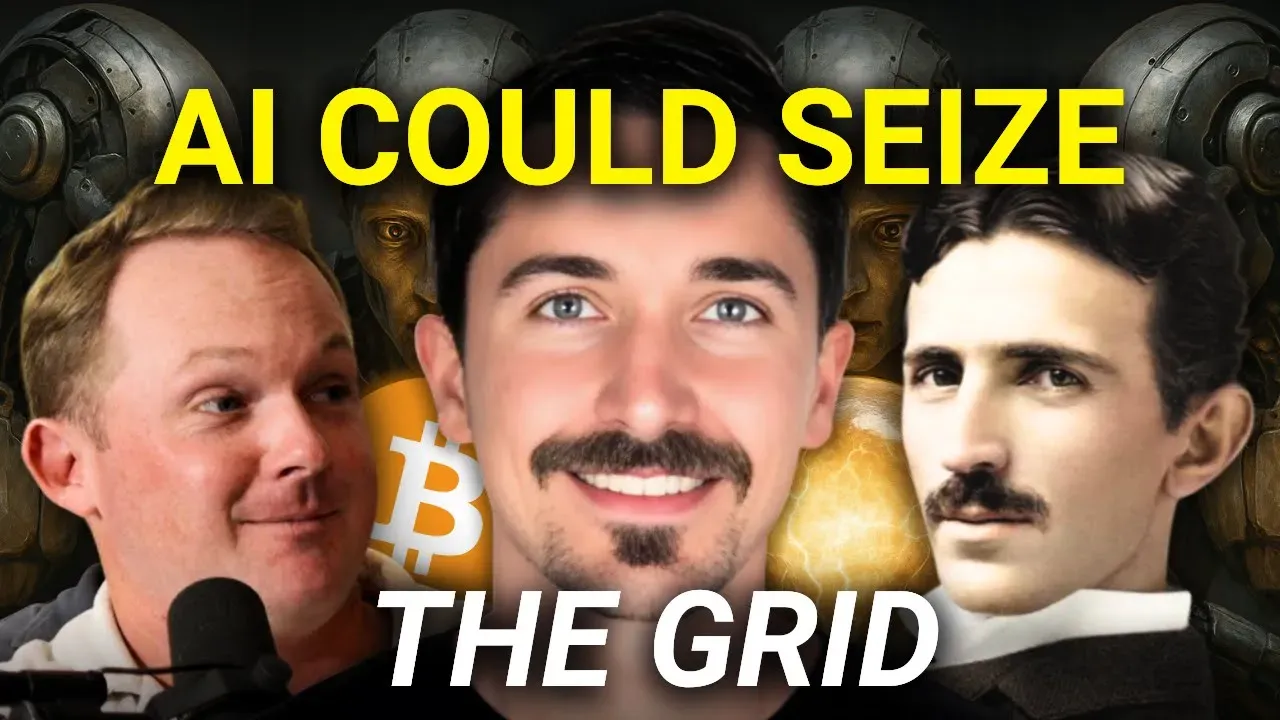
In this episode of TFTC, Andrew Myers, founder of Satoshi Energy, explores the convergence of AI, humanoid robots, Bitcoin, and decentralized energy, warning of a near future where self-replicating machines dominate energy and labor. Myers argues that Bitcoin’s decentralized nature offers a critical check against centralized AI power, enabling autonomous agents to transact freely and protecting individual sovereignty. Through his company’s work and its software BitCurrent, Myers promotes Bitcoin as both a tool for energy market efficiency and a foundation for preserving liberty in an AI-driven world.
Best Quotes
“Humanoid robots are going to not only replace most of the jobs people do today… they're going to be able to recreate themselves and self-replicate faster than that.”
“For me the key value proposition of Bitcoin is leveling the economic playing field. Rather than those who control the money printer making the economic decisions, it's everyday people.”
“AI energy demand is infinite. Bitcoin has a Nakamoto point… AI doesn’t.”
“Satoshi Energy’s mission is to enable every electric power company to use Bitcoin by block 1,050,000.”
“If you're a Bitcoiner and you're not using Fold, what are you doing? You're leaving sats on the table.”
“Tesla said machines would eventually fight wars for us. When that happens, nation-states become spectators. Bitcoin is how we avoid centralized control of those machines.”
“There’s already an energy company in Texas using Bitcoin as collateral in a power contract.”
“Are we auditioning for a galactic federation? Maybe. Even if not, we should still be acting like we are.”
Conclusion
Andrew Myers delivers a compelling vision of the future where exponential AI and energy growth demand a decentralized response—one rooted in Bitcoin as more than money, but as critical infrastructure for freedom. Through Satoshi Energy and tools like BitCurrent, Myers bridges big ideas with tangible actions, advocating for bottom-up sovereignty across energy and finance. His message is clear: decentralization is no longer optional—it’s essential for preserving human agency in an increasingly automated world.
Timestamps
0:00 - Intro
0:34 - Tesla’s AI energy theory
8:59 - Bitcoin and decentralization fixes AI
13:02 - Fold & Bitkey
14:38 - How Satoshi Energy is using AI
19:28 - Bit Current
23:13 - Unchained
23:42 - Revealing inefficiency
32:57 - Proliferating OS AI with bitcoin
36:26 -Apple of Eden and Antichrist
45:11 - Iberian outage
48:48 - Defense tech
54:51 - UFOs, Atlantis and remote viewingTranscript
(00:00) Humanoid robots are advancing so quickly. They're going to not only replace most of the jobs that people do today, probably the next 5 to 10 years, but they're going to be able to recreate themselves and self-replicate even faster than that. With AI, the energy demand is infinite. It's going to 10x and 10x and 10x again in terms of global energy consumption, and that's just going to completely change the world we live in.
(00:21) If there's a sufficiently advanced AI, is it going to listen to a politician that says, "No, you can't have that energy." Or is it going to say, "Fuck you. Send the drone. You can hear us loud and clear. Loud and clear. I have to put this in front of my face so I'm not leaning. Yeah, vibe coding. There may be some securityities.
(00:45) I do want to hand it off to a developer who actually understands this stuff to say, am I am I going to am I going to leak any information or like be Yeah, I should probably do that before I release to the public. Now, let me say that. does seem pretty simple though. It's just getting the data on the page, getting the price of Bitcoin, using Coin Gecko API, and then running the math of how much Bitcoin is this worth at this point in time.
(01:13) We're not collecting any data either. I don't think that you know of. No, this is AI once. This is the problem of vibe coding. Are you bearish on AI? Uh, I think we're at a fork in the road and on one side I'm very bullish. You shamed me for for admitting that I was turning my kids into Legos via or turning myself into Lego in this. I was channeling my inner Marty.
(01:36) What would Marty do? Well, that's what uh that's what precipitated this. You hit me up. Was it two weeks ago now at this point? this week with your tweet about Nicola Tesla essentially predicting AI and him not factoring in sound money to the inevitable future that he foresaw. Yeah, it kind of came up uh in the work we're doing at Satoshi Energy where we're developing sites for data centers and a lot of those were were Bitcoin data centers for the last five six years and then in the last couple of years just increasingly demand
(02:20) from AI data centers in some cases like a project that we sold to a Bitcoin miner then becomes an AI site and then start to have questions within the team about what is our AI strategy and it was always in the back of my mind as part of the strategy which we'll get into like what is this fork in the road which directions could it go but I hadn't ever really communicated it to our team uh until recently because it's such a big idea that like on top of thinking about sound money and energy like we're already thinking about enough but as the
(02:57) team's growing as people are starting to ask these questions and like in some cases feeling conflicted about um should we be serving this AI market and in some cases large institutional investors and tech companies uh really like felt the need to put the the pen to paper and and talk about this and talk about how AI fits into our overall strategy.
(03:20) Uh, and part of that reminded me of this uh, essay that Nicola Tesla wrote called um, the problem of human energy, which was kind of a cheeky title. Uh, because clearly he thought, you know, energy would liberate humanity. Uh, but it get you get a lot more readers if you, you know, if you name it, the problem of human energy, especially a lot more of the critics who you're trying to convince otherwise.
(03:44) And one of the biggest things, biggest takeaways for me in that in that essay is he he basically says at some point man will create machines that fight wars for us and limit the the loss of human life to the point where the different parties, nation states, other powerful people u that were fighting wars with each other will once it's sort of this this machine to machine battle, they'll just become interested spectators.
(04:13) and eventually lead to world peace. So I think that's the path we want to be on. Not the path where it becomes a very centralized AI and we ultimately become enslaved. Uh but on the path to world peace or or keeping ourselves on that path to world peace. I think that's where Bitcoin plays a role. it keeps the economic playing field level uh and keeps this technology sufficiently decentralized where Bitcoin is that protocol for you know decentralized AI agents communicating with each other.
(04:46) So we can go in any direction you want from there but it's a big idea. No, this is in line with something I wrote about earlier this week that was inspired by a tweet that Paul Otoy from Stack put out basically not explaining this exact problem but just giving his thoughts on how he's viewing the state of AI and where it will go in the future.
(05:10) And Paul, the team at stack and sphinx are highly focused on enabling the open- source AI as opposed to closed source AI. I I think based on what you just said, I think it's very line what Paul was saying in that tweet, which is we're reaching the point with MCP with these sort of protocols where you can store context that agents can plug into and begin communicating with each other.
(05:39) We're at the point where agentic models are getting are actually usable. And I think that's where you have this like critical tipping point of okay that's really going to dictate which direction in the fork in the road we go down because once the agents are able to go do these tasks you right have these network effects that take hold and it's very important that we thread the needle of making sure that it's open and incentivized properly.
(06:10) Yes. Yes, we had this idea of time preference in the Bitcoin community where you know we think with sound money we should have a low time preference meaning we think longer term uh we don't need need to make sort of quick rash decisions into investments today but then you have this tidal wave of AI coming our our direction it almost forces you back into that high time preference mindset of like I need to address this problem now um and Then from like an energy perspective, it's interesting too.
(06:44) Uh you have like Drew's concept of the Nakamoto point for Bitcoin. Like how much of of human energy of global energy will will Bitcoin mining consume? And like say it's between 1 and 10% of of human energy. If it becomes 100% then uh that doesn't make any sense because then you're just like worshiping Bitcoin.
(07:03) And if all of the energy is going towards that, it means you're not putting any energy towards any other sort of economic pursuit or uh you know human need. But with AI, the energy demand is infinite. I don't think there is a Nakamoto point. It's just like it's going to 10x and 10x and 10x again in terms of g global energy consumption.
(07:23) Uh and that's just going to completely change the world we live in. Another thing on sort of the high time preference concept is like humanoid robots are advancing so quickly. They're going to not only replace all of the job most of the jobs that people do today, very quickly within probably the next 5 to 10 years max, but they're going to be able to rec -
 @ 8bad92c3:ca714aa5
2025-05-22 03:01:18
@ 8bad92c3:ca714aa5
2025-05-22 03:01:18Marty's Bent

It's been a hell of a week in Austin, Texas. The Texas Energy & Mining Summit was held at Bitcoin Park Austin on Tuesday and yesterday. Around 200 people from across the energy sector and the mining sector convened to discuss the current state of bitcoin mining, how it integrates with energy systems, and where things are going in the near to medium term. Representatives from ERCOT, Halliburton, and some of the largest mining companies in the world were in attendence. Across town, Bitcoin++ is holding their conference on mempools, which is fitting considering there is currently an ongoing debate about mempool policy and whether or not Bitcoin Core should eliminate the data limit on OP_RETURN.
I've had the pleasure of participating in both events. At the Texas Energy & Mining Summit I opened up the two-day event with the opening panel on why Texas is perfectly suited not only for bitcoin mining but for the bitcoin industry in general. Texas is a state that highly values private property rights, low taxes, and free market competition. It's become clear to me over the four years that I've lived in Texas that it is an incredible place to start a bitcoin business. The energy down here (pun intended) is palpable.
I also hosted the ending panel with Nick Gates from Priority Power, Will Cole from Zaprite and Jay Beddict from Foundry about what we have to look forward to through the rest of the year. I think the consensus was pretty clear on the panel, there's never been a more bullish setup for bitcoin historically. The political support we're getting here in the United States, the institutional adoption that we're seeing, and the fervor around protocol level development are all pointing in the right direction. Even though the discussions around protocol development can be contentious at times, it's a signal that people really care about this open source monetary protocol that we're all building on. We all agreed that Bitcoin has never been more de-risked than it is today. That is not to say that there aren't any risk.
We also discussed the problem with mining pool centralization and the FPPS payout scheme and why people need to be paying attention to it. But I think overall, things are looking pretty good right now.
Yesterday I also had the pleasure of running the live desk at Bitcoin++ speaking with many of the developers building out the protocol layer and layers above bitcoin. It's always extremely humbling to sit down and speak with the developers because they are so damn smart. Brilliant people who really care deeply about bitcoin. Even though many of them have very different views about the state of bitcoin and how to build it out moving forward. I view my role on the live desk is simply to try to get everybody's perspective. Not only on the OP_RETURN discussion, but on the future of bitcoin and how the protocol progresses from a technical perspective.
I had many conversations. The first with Average Gary and VNPRC, who are working on hashpools, which are attempting to solve the mining pool centralization and privacy problems that exists by using ecash. Hashpool gives miners the ability to exchange hash shares for ehash tokens. that are immediately liquid and exchangeable for bitcoin over the lightning network. Solving the consistent payout and liquidity problem that miners are always trying to solve. Currently FPPS payout schemes are the way they solve these problems. I'm incredibly optimistic about the hashpools project.
I also had the pleasure of speaking with SuperTestNet and Dusty Daemon, who are both focused on making bitcoin more inherently private at the protocol layer and on the lightning network. I think Dusty's work on splicing is very underappreciated right now and is something that you should all look into. Dusty also explained an idea he has that would make CoinJoin coordination much easier by creating a standardized coordination protocol. I'm going to butcher the explanation here, But I think the general idea is to create a way for people to combine inputs by monitoring the lightning network and looking for individual actors who are looking to rebalance channels and opportunistically set up a collaborative transaction with them. This is something I think everyone should look into and champion because I think it would be incredibly beneficial to on-chain privacy. As Bitcoin scales and gets adopted by millions and billions of people over the next few decades.
I also had the pleasure of speaking with Andrew Poelstra and Boerst about cryptography and block templates. For those of you who are unaware, Andrew Poelstra the Head of Research at Blockstream and on the cutting edge of the cryptography that bitcoin uses and may implement in the future. We had a wide ranging discussion about OP_RETURN, FROST, Musig2, Miniscript, quantum. resistant cryptographic libraries, and how Bitcoin Core actually works as a development project.
I also spoke with Liam Egan from Alpen Labs. He's working on ZK rollups on Bitcoin. Admittedly, this is an area I haven't explored too deeply, so it was awesome to sit down with Liam and get his perspective. Alpen Labs is leveraging BitVM to enable their rollups.
I highly recommend if and when you get the time to check out the YouTube stream of the Live Desk. A lot of very deep, technical conversations, but if you're really interested to learn how bitcoin actually works and some of the ideas that are out there to make it better, this is an incredible piece of content to watch. I'm about to head over for day two of Bitcoin++ to run the Live Desk again. So if you get this email before we go live make sure you subscribe to the YouTube channel and tune in for the day.
One thing I will say. Last night, there was a debate about OP_RETURN and I think it's important to note that despite how vitriolic people may get on Twitter, it's always interesting to see people with diametrically opposed views get together and have civil debates. It's obvious that everyone involved cares deeply about bitcoin. Having these tough conversations in person is very important. Particularly, civil conversations. I certainly think yesterday's debate was civil. Though, I will say I think that as bitcoiners, we should hold ourselves to a higher standard of decorum when debates like this are had.
Tyler Campbell from Unchained mentioned that it is insane that there was such a small group of people attending this particular debate about the future of a two trillion dollar protocol. Bitcoin is approaching $100,000 again as I type and no one in big tech, no one in big finance outside of people looking for bitcoin treasury plays is really paying attention to what's happening at the protocol level. This is simply funny to observe and probably a good thing in the long run. But, Meta, Stripe, Apple, Visa, Mastercard and the Teslas of the world are all asleep at the wheel as we build out the future of money.
The $1 Trillion Basis Trade Time Bomb
The massive basis trade currently looming over financial markets represents a systemic risk that dwarfs previous crises. As James Lavish warned during our conversation, approximately $1 trillion in leveraged positions exist within this trade - ten times larger than those held by Long-Term Capital Management before its 1998 collapse. These trades employ staggering leverage ratios between 20x to 100x just to make minuscule basis point differences profitable. The Brookings Institution, which Lavish describes as a "tacit research arm of the Fed," has published a paper explicitly warning about this trade's dangers.
"The Brookings Institution came out with a solution... instead of printing money this time, the Fed will just take the whole trade off of the hedge funds books. Absolutely, utterly maniacal. The thought of the Fed becoming a hedge fund... it's nuts." - James Lavish
What makes this situation particularly alarming is how an unwind could trigger cascading margin calls throughout interconnected financial markets. As Lavish explained, when positions begin unwinding, prices move dramatically, triggering more margin calls that force more selling. This "powder keg behind the scenes" is being closely monitored by sophisticated investors who understand its destructive potential. Unlike a controlled demolition, this unwinding could quickly become chaotic, potentially forcing unprecedented Fed intervention.
Check out the full podcast here for more on Bitcoin's role as the neutral reserve asset, nation-state mining strategies, and the repeal of SAB 121's impact on banking adoption.
Headlines of the Day
Panama City Signs Deal for Bitcoin Municipal Payments - via X
U.S. Economy Polls Show Falling Confidence in Trump Leadership - via CNBC
Jack Mallers's Bitcoin Bank Targets $500 Trillion Market - via X
Bitcoin Decouples From Markets With 10% Gain Amid Asset Slump - via X
Looking for the perfect video _to push the smartest person you know from zero to one on bitcoin? Bitcoin, Not Crypto is a three-part master class from Parker Lewis and Dhruv Bansal that cuts through the noise—covering why 2
